Assignment on Career Planning and Development
VerifiedAdded on 2022/08/26
|17
|5145
|17
AI Summary
Contribute Materials
Your contribution can guide someone’s learning journey. Share your
documents today.
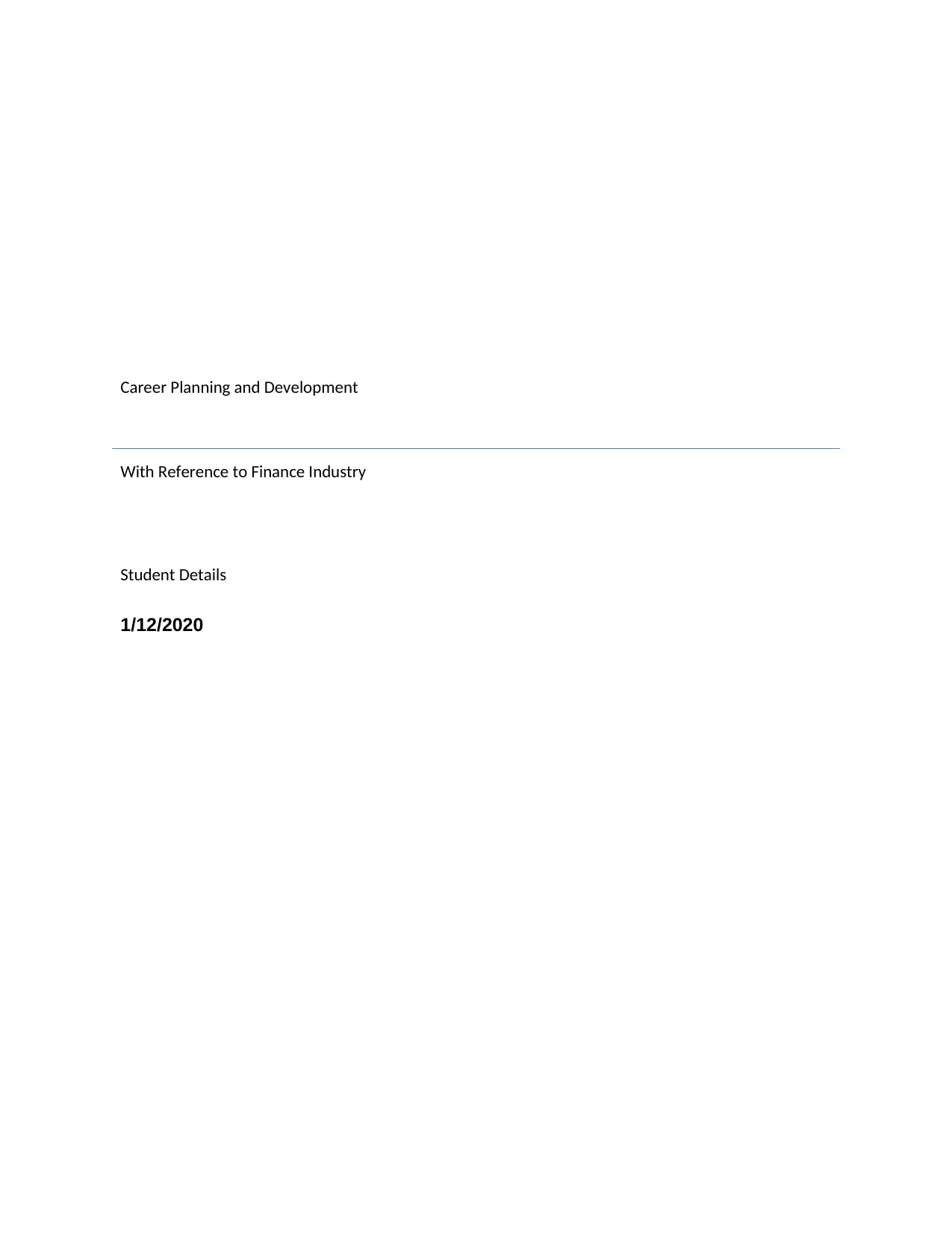
Career Planning and Development
With Reference to Finance Industry
Student Details
1/12/2020
With Reference to Finance Industry
Student Details
1/12/2020
Secure Best Marks with AI Grader
Need help grading? Try our AI Grader for instant feedback on your assignments.
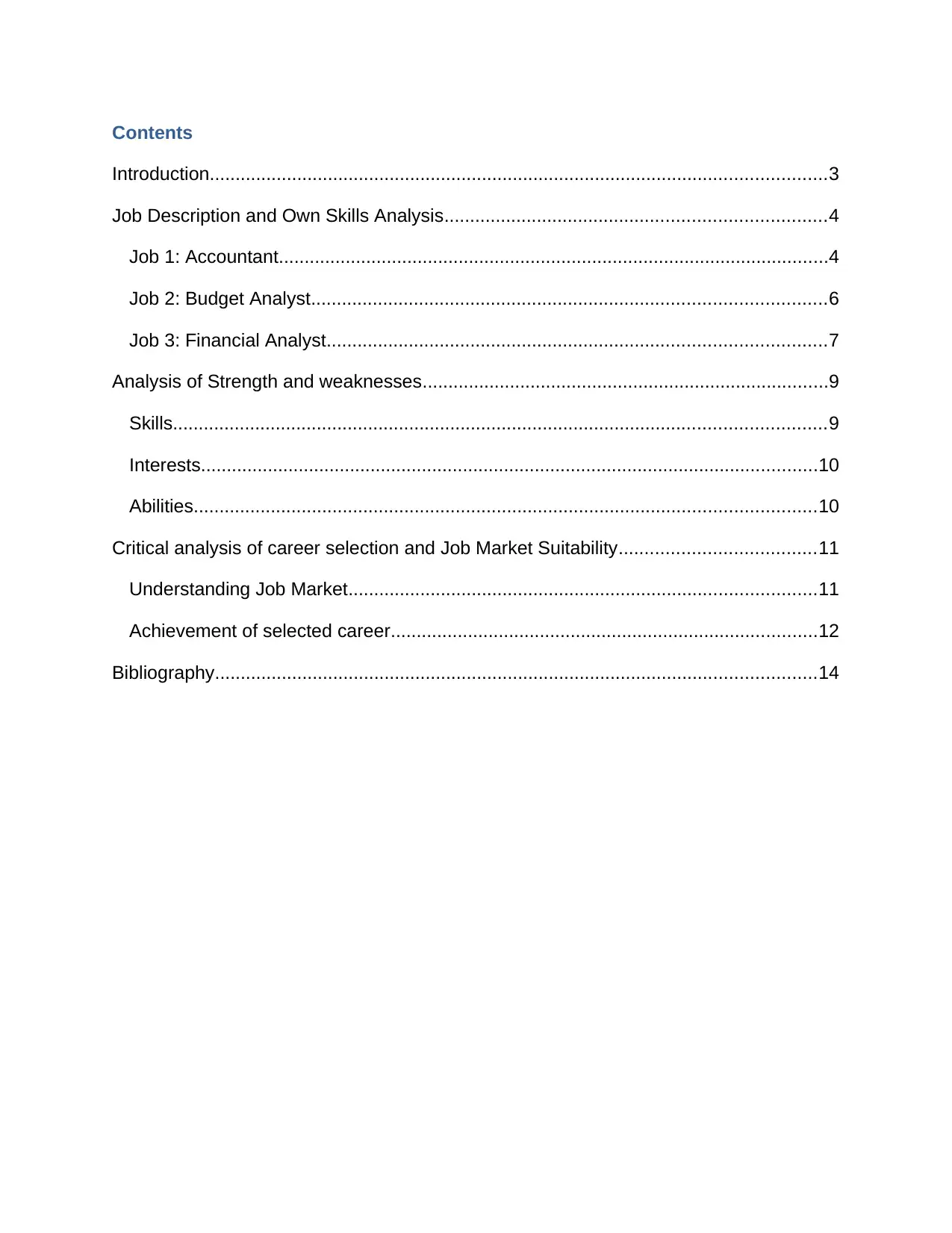
Contents
Introduction........................................................................................................................3
Job Description and Own Skills Analysis..........................................................................4
Job 1: Accountant...........................................................................................................4
Job 2: Budget Analyst....................................................................................................6
Job 3: Financial Analyst.................................................................................................7
Analysis of Strength and weaknesses...............................................................................9
Skills...............................................................................................................................9
Interests........................................................................................................................10
Abilities.........................................................................................................................10
Critical analysis of career selection and Job Market Suitability......................................11
Understanding Job Market...........................................................................................11
Achievement of selected career...................................................................................12
Bibliography.....................................................................................................................14
Introduction........................................................................................................................3
Job Description and Own Skills Analysis..........................................................................4
Job 1: Accountant...........................................................................................................4
Job 2: Budget Analyst....................................................................................................6
Job 3: Financial Analyst.................................................................................................7
Analysis of Strength and weaknesses...............................................................................9
Skills...............................................................................................................................9
Interests........................................................................................................................10
Abilities.........................................................................................................................10
Critical analysis of career selection and Job Market Suitability......................................11
Understanding Job Market...........................................................................................11
Achievement of selected career...................................................................................12
Bibliography.....................................................................................................................14
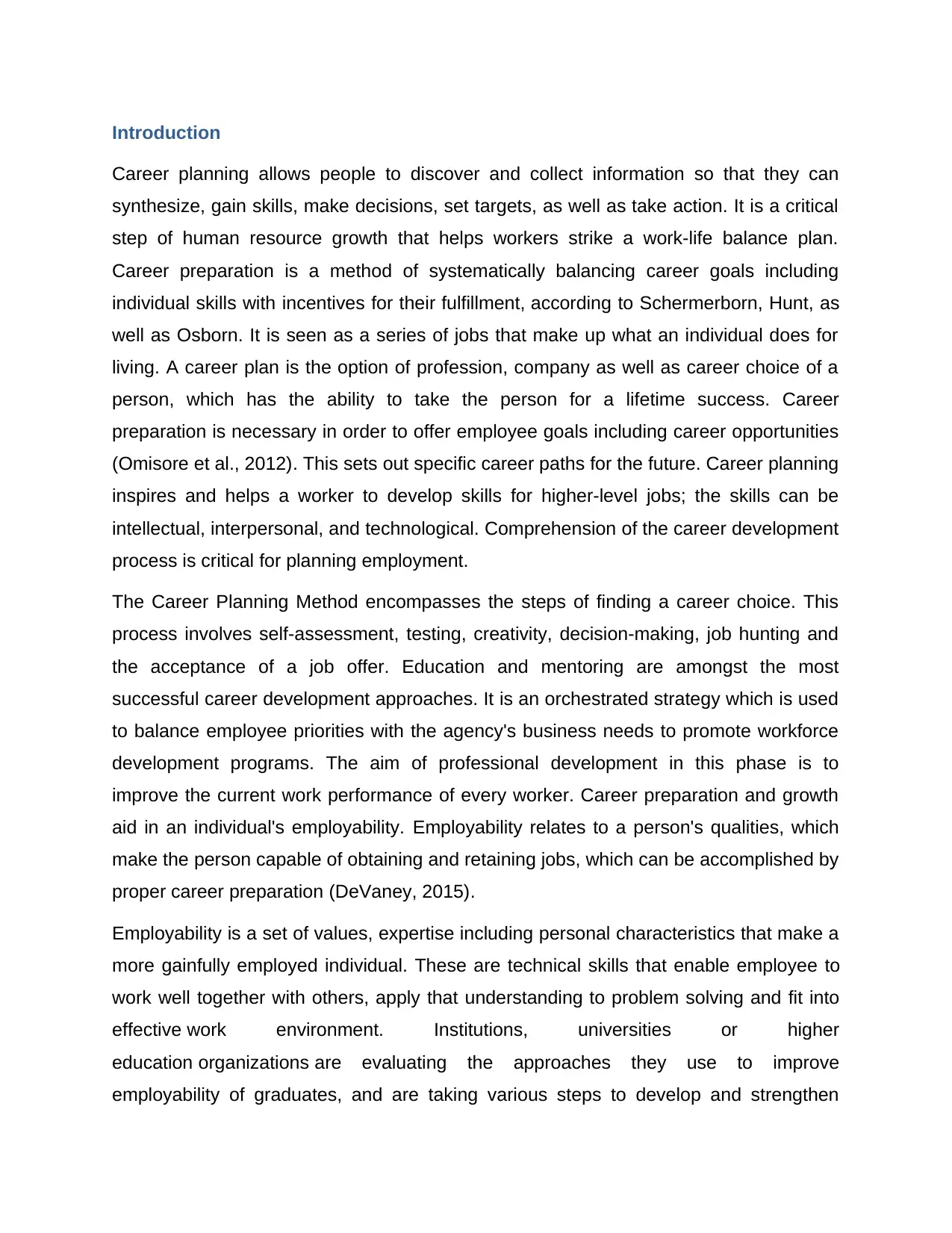
Introduction
Career planning allows people to discover and collect information so that they can
synthesize, gain skills, make decisions, set targets, as well as take action. It is a critical
step of human resource growth that helps workers strike a work-life balance plan.
Career preparation is a method of systematically balancing career goals including
individual skills with incentives for their fulfillment, according to Schermerborn, Hunt, as
well as Osborn. It is seen as a series of jobs that make up what an individual does for
living. A career plan is the option of profession, company as well as career choice of a
person, which has the ability to take the person for a lifetime success. Career
preparation is necessary in order to offer employee goals including career opportunities
(Omisore et al., 2012). This sets out specific career paths for the future. Career planning
inspires and helps a worker to develop skills for higher-level jobs; the skills can be
intellectual, interpersonal, and technological. Comprehension of the career development
process is critical for planning employment.
The Career Planning Method encompasses the steps of finding a career choice. This
process involves self-assessment, testing, creativity, decision-making, job hunting and
the acceptance of a job offer. Education and mentoring are amongst the most
successful career development approaches. It is an orchestrated strategy which is used
to balance employee priorities with the agency's business needs to promote workforce
development programs. The aim of professional development in this phase is to
improve the current work performance of every worker. Career preparation and growth
aid in an individual's employability. Employability relates to a person's qualities, which
make the person capable of obtaining and retaining jobs, which can be accomplished by
proper career preparation (DeVaney, 2015).
Employability is a set of values, expertise including personal characteristics that make a
more gainfully employed individual. These are technical skills that enable employee to
work well together with others, apply that understanding to problem solving and fit into
effective work environment. Institutions, universities or higher
education organizations are evaluating the approaches they use to improve
employability of graduates, and are taking various steps to develop and strengthen
Career planning allows people to discover and collect information so that they can
synthesize, gain skills, make decisions, set targets, as well as take action. It is a critical
step of human resource growth that helps workers strike a work-life balance plan.
Career preparation is a method of systematically balancing career goals including
individual skills with incentives for their fulfillment, according to Schermerborn, Hunt, as
well as Osborn. It is seen as a series of jobs that make up what an individual does for
living. A career plan is the option of profession, company as well as career choice of a
person, which has the ability to take the person for a lifetime success. Career
preparation is necessary in order to offer employee goals including career opportunities
(Omisore et al., 2012). This sets out specific career paths for the future. Career planning
inspires and helps a worker to develop skills for higher-level jobs; the skills can be
intellectual, interpersonal, and technological. Comprehension of the career development
process is critical for planning employment.
The Career Planning Method encompasses the steps of finding a career choice. This
process involves self-assessment, testing, creativity, decision-making, job hunting and
the acceptance of a job offer. Education and mentoring are amongst the most
successful career development approaches. It is an orchestrated strategy which is used
to balance employee priorities with the agency's business needs to promote workforce
development programs. The aim of professional development in this phase is to
improve the current work performance of every worker. Career preparation and growth
aid in an individual's employability. Employability relates to a person's qualities, which
make the person capable of obtaining and retaining jobs, which can be accomplished by
proper career preparation (DeVaney, 2015).
Employability is a set of values, expertise including personal characteristics that make a
more gainfully employed individual. These are technical skills that enable employee to
work well together with others, apply that understanding to problem solving and fit into
effective work environment. Institutions, universities or higher
education organizations are evaluating the approaches they use to improve
employability of graduates, and are taking various steps to develop and strengthen
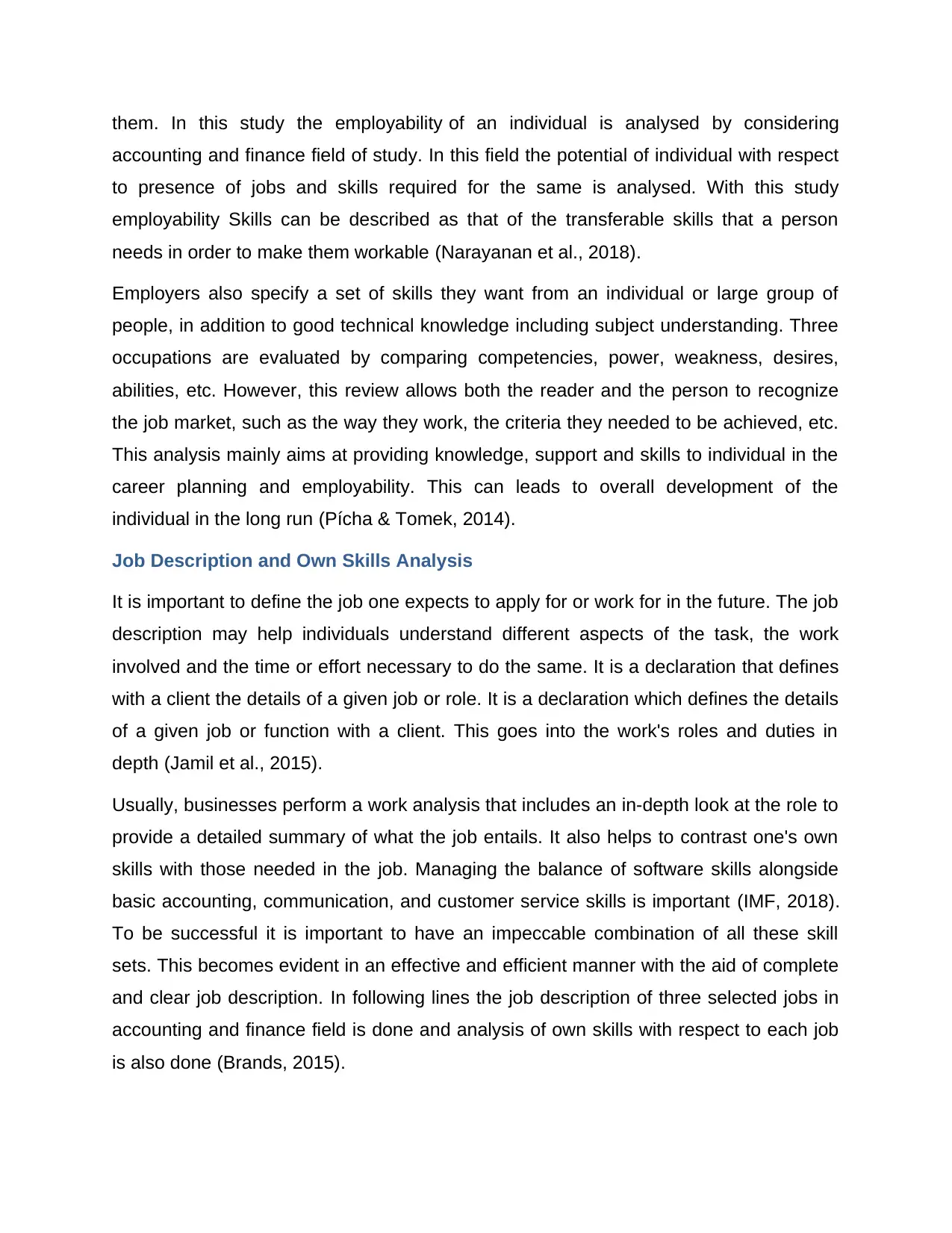
them. In this study the employability of an individual is analysed by considering
accounting and finance field of study. In this field the potential of individual with respect
to presence of jobs and skills required for the same is analysed. With this study
employability Skills can be described as that of the transferable skills that a person
needs in order to make them workable (Narayanan et al., 2018).
Employers also specify a set of skills they want from an individual or large group of
people, in addition to good technical knowledge including subject understanding. Three
occupations are evaluated by comparing competencies, power, weakness, desires,
abilities, etc. However, this review allows both the reader and the person to recognize
the job market, such as the way they work, the criteria they needed to be achieved, etc.
This analysis mainly aims at providing knowledge, support and skills to individual in the
career planning and employability. This can leads to overall development of the
individual in the long run (Pícha & Tomek, 2014).
Job Description and Own Skills Analysis
It is important to define the job one expects to apply for or work for in the future. The job
description may help individuals understand different aspects of the task, the work
involved and the time or effort necessary to do the same. It is a declaration that defines
with a client the details of a given job or role. It is a declaration which defines the details
of a given job or function with a client. This goes into the work's roles and duties in
depth (Jamil et al., 2015).
Usually, businesses perform a work analysis that includes an in-depth look at the role to
provide a detailed summary of what the job entails. It also helps to contrast one's own
skills with those needed in the job. Managing the balance of software skills alongside
basic accounting, communication, and customer service skills is important (IMF, 2018).
To be successful it is important to have an impeccable combination of all these skill
sets. This becomes evident in an effective and efficient manner with the aid of complete
and clear job description. In following lines the job description of three selected jobs in
accounting and finance field is done and analysis of own skills with respect to each job
is also done (Brands, 2015).
accounting and finance field of study. In this field the potential of individual with respect
to presence of jobs and skills required for the same is analysed. With this study
employability Skills can be described as that of the transferable skills that a person
needs in order to make them workable (Narayanan et al., 2018).
Employers also specify a set of skills they want from an individual or large group of
people, in addition to good technical knowledge including subject understanding. Three
occupations are evaluated by comparing competencies, power, weakness, desires,
abilities, etc. However, this review allows both the reader and the person to recognize
the job market, such as the way they work, the criteria they needed to be achieved, etc.
This analysis mainly aims at providing knowledge, support and skills to individual in the
career planning and employability. This can leads to overall development of the
individual in the long run (Pícha & Tomek, 2014).
Job Description and Own Skills Analysis
It is important to define the job one expects to apply for or work for in the future. The job
description may help individuals understand different aspects of the task, the work
involved and the time or effort necessary to do the same. It is a declaration that defines
with a client the details of a given job or role. It is a declaration which defines the details
of a given job or function with a client. This goes into the work's roles and duties in
depth (Jamil et al., 2015).
Usually, businesses perform a work analysis that includes an in-depth look at the role to
provide a detailed summary of what the job entails. It also helps to contrast one's own
skills with those needed in the job. Managing the balance of software skills alongside
basic accounting, communication, and customer service skills is important (IMF, 2018).
To be successful it is important to have an impeccable combination of all these skill
sets. This becomes evident in an effective and efficient manner with the aid of complete
and clear job description. In following lines the job description of three selected jobs in
accounting and finance field is done and analysis of own skills with respect to each job
is also done (Brands, 2015).
Secure Best Marks with AI Grader
Need help grading? Try our AI Grader for instant feedback on your assignments.
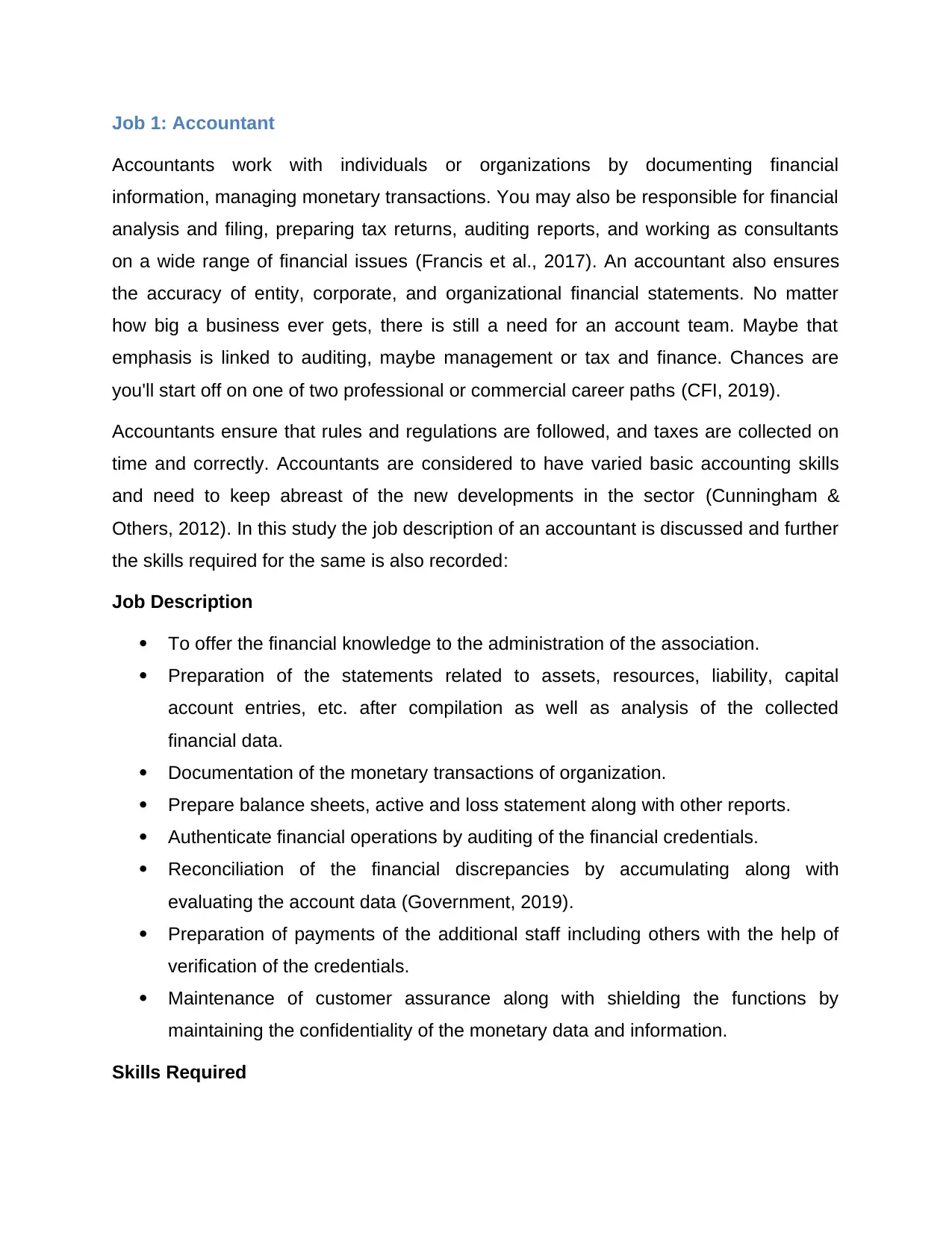
Job 1: Accountant
Accountants work with individuals or organizations by documenting financial
information, managing monetary transactions. You may also be responsible for financial
analysis and filing, preparing tax returns, auditing reports, and working as consultants
on a wide range of financial issues (Francis et al., 2017). An accountant also ensures
the accuracy of entity, corporate, and organizational financial statements. No matter
how big a business ever gets, there is still a need for an account team. Maybe that
emphasis is linked to auditing, maybe management or tax and finance. Chances are
you'll start off on one of two professional or commercial career paths (CFI, 2019).
Accountants ensure that rules and regulations are followed, and taxes are collected on
time and correctly. Accountants are considered to have varied basic accounting skills
and need to keep abreast of the new developments in the sector (Cunningham &
Others, 2012). In this study the job description of an accountant is discussed and further
the skills required for the same is also recorded:
Job Description
To offer the financial knowledge to the administration of the association.
Preparation of the statements related to assets, resources, liability, capital
account entries, etc. after compilation as well as analysis of the collected
financial data.
Documentation of the monetary transactions of organization.
Prepare balance sheets, active and loss statement along with other reports.
Authenticate financial operations by auditing of the financial credentials.
Reconciliation of the financial discrepancies by accumulating along with
evaluating the account data (Government, 2019).
Preparation of payments of the additional staff including others with the help of
verification of the credentials.
Maintenance of customer assurance along with shielding the functions by
maintaining the confidentiality of the monetary data and information.
Skills Required
Accountants work with individuals or organizations by documenting financial
information, managing monetary transactions. You may also be responsible for financial
analysis and filing, preparing tax returns, auditing reports, and working as consultants
on a wide range of financial issues (Francis et al., 2017). An accountant also ensures
the accuracy of entity, corporate, and organizational financial statements. No matter
how big a business ever gets, there is still a need for an account team. Maybe that
emphasis is linked to auditing, maybe management or tax and finance. Chances are
you'll start off on one of two professional or commercial career paths (CFI, 2019).
Accountants ensure that rules and regulations are followed, and taxes are collected on
time and correctly. Accountants are considered to have varied basic accounting skills
and need to keep abreast of the new developments in the sector (Cunningham &
Others, 2012). In this study the job description of an accountant is discussed and further
the skills required for the same is also recorded:
Job Description
To offer the financial knowledge to the administration of the association.
Preparation of the statements related to assets, resources, liability, capital
account entries, etc. after compilation as well as analysis of the collected
financial data.
Documentation of the monetary transactions of organization.
Prepare balance sheets, active and loss statement along with other reports.
Authenticate financial operations by auditing of the financial credentials.
Reconciliation of the financial discrepancies by accumulating along with
evaluating the account data (Government, 2019).
Preparation of payments of the additional staff including others with the help of
verification of the credentials.
Maintenance of customer assurance along with shielding the functions by
maintaining the confidentiality of the monetary data and information.
Skills Required
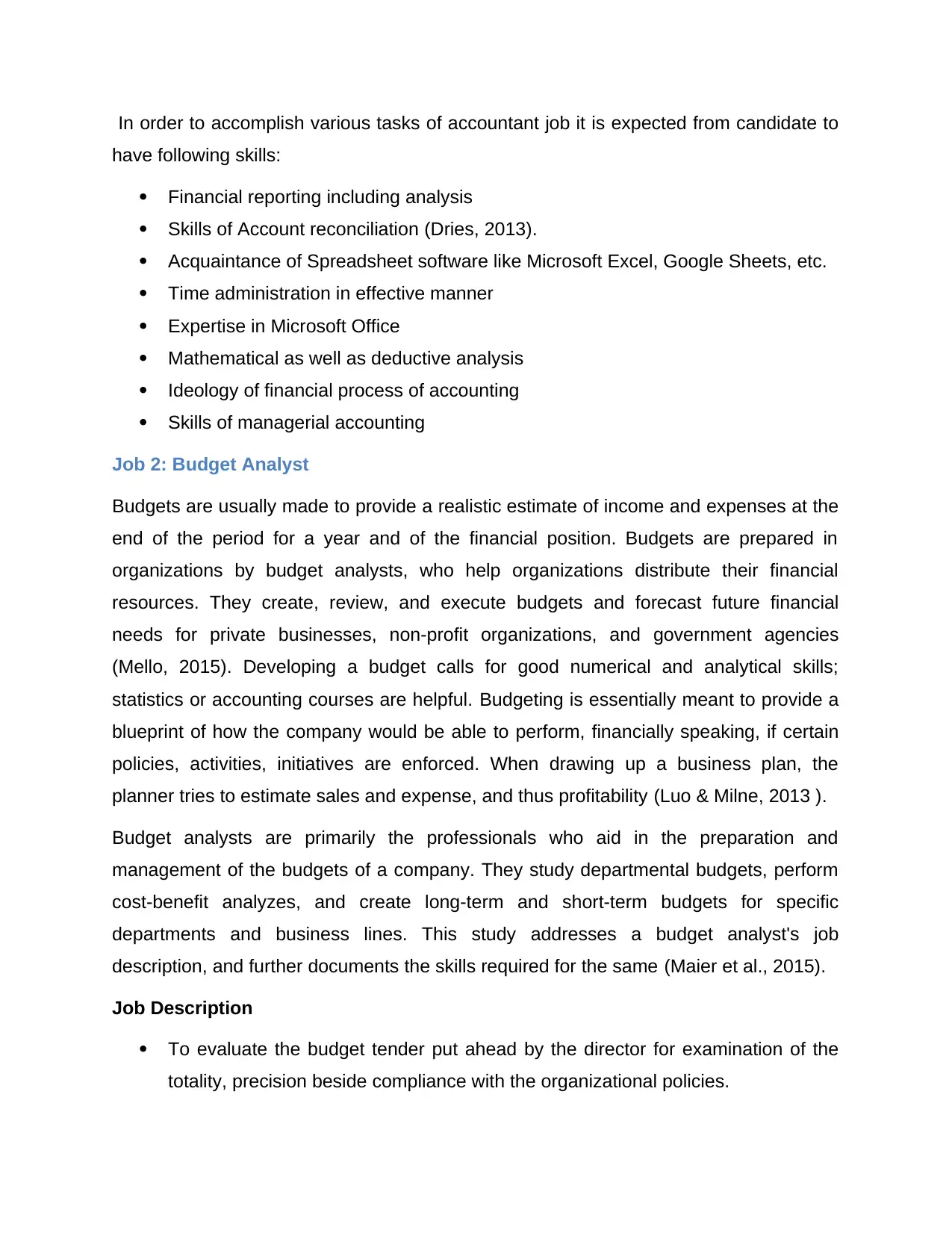
In order to accomplish various tasks of accountant job it is expected from candidate to
have following skills:
Financial reporting including analysis
Skills of Account reconciliation (Dries, 2013).
Acquaintance of Spreadsheet software like Microsoft Excel, Google Sheets, etc.
Time administration in effective manner
Expertise in Microsoft Office
Mathematical as well as deductive analysis
Ideology of financial process of accounting
Skills of managerial accounting
Job 2: Budget Analyst
Budgets are usually made to provide a realistic estimate of income and expenses at the
end of the period for a year and of the financial position. Budgets are prepared in
organizations by budget analysts, who help organizations distribute their financial
resources. They create, review, and execute budgets and forecast future financial
needs for private businesses, non-profit organizations, and government agencies
(Mello, 2015). Developing a budget calls for good numerical and analytical skills;
statistics or accounting courses are helpful. Budgeting is essentially meant to provide a
blueprint of how the company would be able to perform, financially speaking, if certain
policies, activities, initiatives are enforced. When drawing up a business plan, the
planner tries to estimate sales and expense, and thus profitability (Luo & Milne, 2013 ).
Budget analysts are primarily the professionals who aid in the preparation and
management of the budgets of a company. They study departmental budgets, perform
cost-benefit analyzes, and create long-term and short-term budgets for specific
departments and business lines. This study addresses a budget analyst's job
description, and further documents the skills required for the same (Maier et al., 2015).
Job Description
To evaluate the budget tender put ahead by the director for examination of the
totality, precision beside compliance with the organizational policies.
have following skills:
Financial reporting including analysis
Skills of Account reconciliation (Dries, 2013).
Acquaintance of Spreadsheet software like Microsoft Excel, Google Sheets, etc.
Time administration in effective manner
Expertise in Microsoft Office
Mathematical as well as deductive analysis
Ideology of financial process of accounting
Skills of managerial accounting
Job 2: Budget Analyst
Budgets are usually made to provide a realistic estimate of income and expenses at the
end of the period for a year and of the financial position. Budgets are prepared in
organizations by budget analysts, who help organizations distribute their financial
resources. They create, review, and execute budgets and forecast future financial
needs for private businesses, non-profit organizations, and government agencies
(Mello, 2015). Developing a budget calls for good numerical and analytical skills;
statistics or accounting courses are helpful. Budgeting is essentially meant to provide a
blueprint of how the company would be able to perform, financially speaking, if certain
policies, activities, initiatives are enforced. When drawing up a business plan, the
planner tries to estimate sales and expense, and thus profitability (Luo & Milne, 2013 ).
Budget analysts are primarily the professionals who aid in the preparation and
management of the budgets of a company. They study departmental budgets, perform
cost-benefit analyzes, and create long-term and short-term budgets for specific
departments and business lines. This study addresses a budget analyst's job
description, and further documents the skills required for the same (Maier et al., 2015).
Job Description
To evaluate the budget tender put ahead by the director for examination of the
totality, precision beside compliance with the organizational policies.
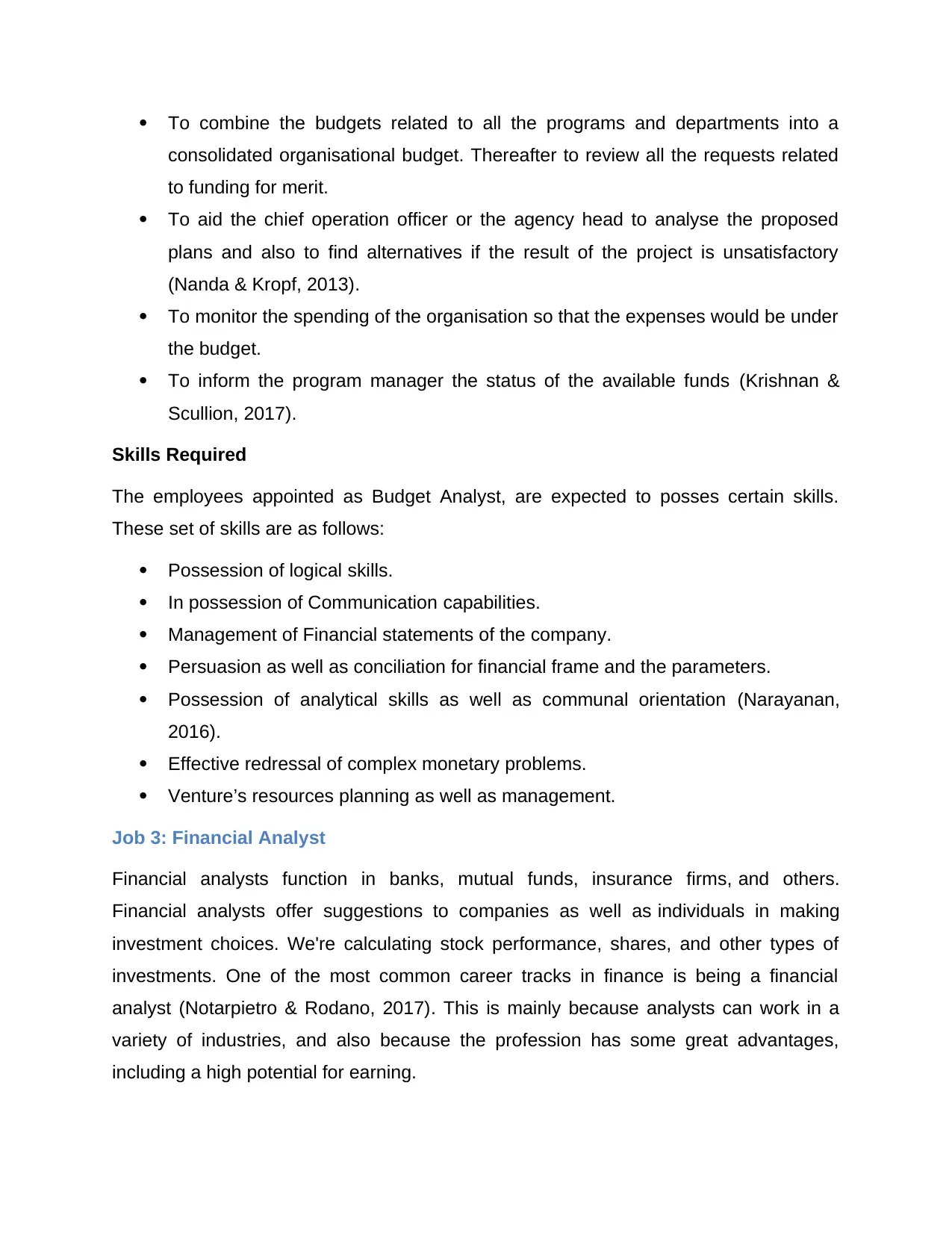
To combine the budgets related to all the programs and departments into a
consolidated organisational budget. Thereafter to review all the requests related
to funding for merit.
To aid the chief operation officer or the agency head to analyse the proposed
plans and also to find alternatives if the result of the project is unsatisfactory
(Nanda & Kropf, 2013).
To monitor the spending of the organisation so that the expenses would be under
the budget.
To inform the program manager the status of the available funds (Krishnan &
Scullion, 2017).
Skills Required
The employees appointed as Budget Analyst, are expected to posses certain skills.
These set of skills are as follows:
Possession of logical skills.
In possession of Communication capabilities.
Management of Financial statements of the company.
Persuasion as well as conciliation for financial frame and the parameters.
Possession of analytical skills as well as communal orientation (Narayanan,
2016).
Effective redressal of complex monetary problems.
Venture’s resources planning as well as management.
Job 3: Financial Analyst
Financial analysts function in banks, mutual funds, insurance firms, and others.
Financial analysts offer suggestions to companies as well as individuals in making
investment choices. We're calculating stock performance, shares, and other types of
investments. One of the most common career tracks in finance is being a financial
analyst (Notarpietro & Rodano, 2017). This is mainly because analysts can work in a
variety of industries, and also because the profession has some great advantages,
including a high potential for earning.
consolidated organisational budget. Thereafter to review all the requests related
to funding for merit.
To aid the chief operation officer or the agency head to analyse the proposed
plans and also to find alternatives if the result of the project is unsatisfactory
(Nanda & Kropf, 2013).
To monitor the spending of the organisation so that the expenses would be under
the budget.
To inform the program manager the status of the available funds (Krishnan &
Scullion, 2017).
Skills Required
The employees appointed as Budget Analyst, are expected to posses certain skills.
These set of skills are as follows:
Possession of logical skills.
In possession of Communication capabilities.
Management of Financial statements of the company.
Persuasion as well as conciliation for financial frame and the parameters.
Possession of analytical skills as well as communal orientation (Narayanan,
2016).
Effective redressal of complex monetary problems.
Venture’s resources planning as well as management.
Job 3: Financial Analyst
Financial analysts function in banks, mutual funds, insurance firms, and others.
Financial analysts offer suggestions to companies as well as individuals in making
investment choices. We're calculating stock performance, shares, and other types of
investments. One of the most common career tracks in finance is being a financial
analyst (Notarpietro & Rodano, 2017). This is mainly because analysts can work in a
variety of industries, and also because the profession has some great advantages,
including a high potential for earning.
Paraphrase This Document
Need a fresh take? Get an instant paraphrase of this document with our AI Paraphraser
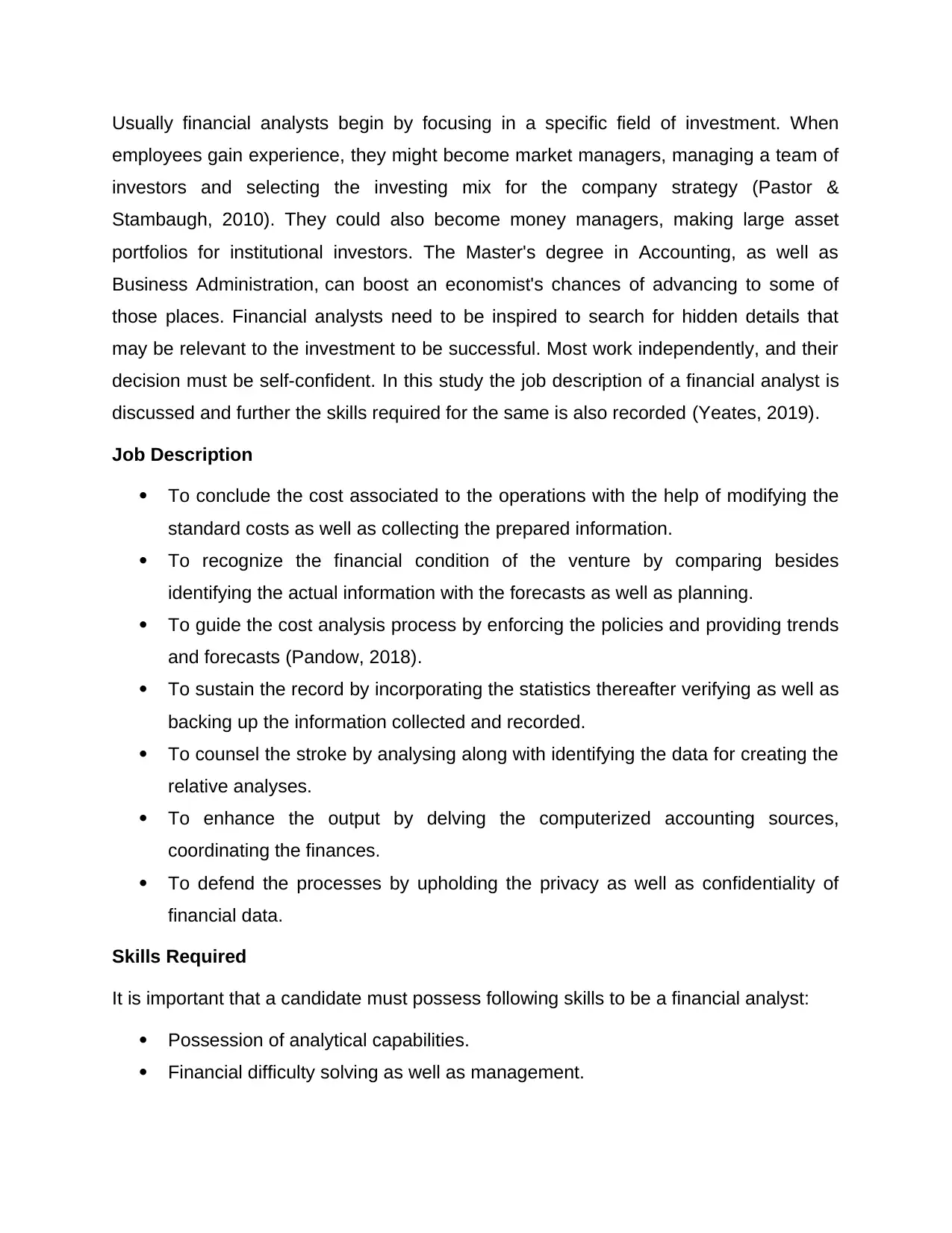
Usually financial analysts begin by focusing in a specific field of investment. When
employees gain experience, they might become market managers, managing a team of
investors and selecting the investing mix for the company strategy (Pastor &
Stambaugh, 2010). They could also become money managers, making large asset
portfolios for institutional investors. The Master's degree in Accounting, as well as
Business Administration, can boost an economist's chances of advancing to some of
those places. Financial analysts need to be inspired to search for hidden details that
may be relevant to the investment to be successful. Most work independently, and their
decision must be self-confident. In this study the job description of a financial analyst is
discussed and further the skills required for the same is also recorded (Yeates, 2019).
Job Description
To conclude the cost associated to the operations with the help of modifying the
standard costs as well as collecting the prepared information.
To recognize the financial condition of the venture by comparing besides
identifying the actual information with the forecasts as well as planning.
To guide the cost analysis process by enforcing the policies and providing trends
and forecasts (Pandow, 2018).
To sustain the record by incorporating the statistics thereafter verifying as well as
backing up the information collected and recorded.
To counsel the stroke by analysing along with identifying the data for creating the
relative analyses.
To enhance the output by delving the computerized accounting sources,
coordinating the finances.
To defend the processes by upholding the privacy as well as confidentiality of
financial data.
Skills Required
It is important that a candidate must possess following skills to be a financial analyst:
Possession of analytical capabilities.
Financial difficulty solving as well as management.
employees gain experience, they might become market managers, managing a team of
investors and selecting the investing mix for the company strategy (Pastor &
Stambaugh, 2010). They could also become money managers, making large asset
portfolios for institutional investors. The Master's degree in Accounting, as well as
Business Administration, can boost an economist's chances of advancing to some of
those places. Financial analysts need to be inspired to search for hidden details that
may be relevant to the investment to be successful. Most work independently, and their
decision must be self-confident. In this study the job description of a financial analyst is
discussed and further the skills required for the same is also recorded (Yeates, 2019).
Job Description
To conclude the cost associated to the operations with the help of modifying the
standard costs as well as collecting the prepared information.
To recognize the financial condition of the venture by comparing besides
identifying the actual information with the forecasts as well as planning.
To guide the cost analysis process by enforcing the policies and providing trends
and forecasts (Pandow, 2018).
To sustain the record by incorporating the statistics thereafter verifying as well as
backing up the information collected and recorded.
To counsel the stroke by analysing along with identifying the data for creating the
relative analyses.
To enhance the output by delving the computerized accounting sources,
coordinating the finances.
To defend the processes by upholding the privacy as well as confidentiality of
financial data.
Skills Required
It is important that a candidate must possess following skills to be a financial analyst:
Possession of analytical capabilities.
Financial difficulty solving as well as management.
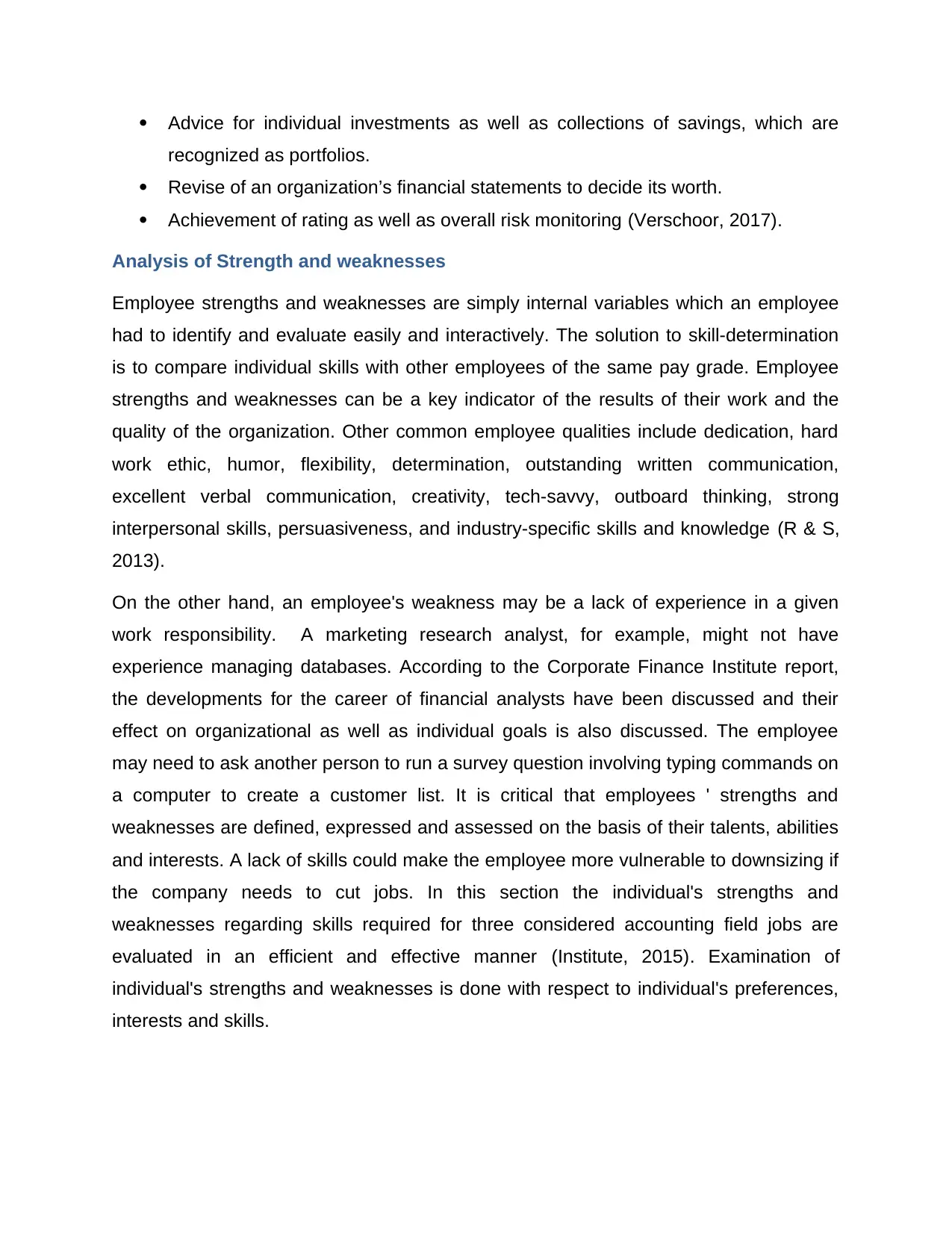
Advice for individual investments as well as collections of savings, which are
recognized as portfolios.
Revise of an organization’s financial statements to decide its worth.
Achievement of rating as well as overall risk monitoring (Verschoor, 2017).
Analysis of Strength and weaknesses
Employee strengths and weaknesses are simply internal variables which an employee
had to identify and evaluate easily and interactively. The solution to skill-determination
is to compare individual skills with other employees of the same pay grade. Employee
strengths and weaknesses can be a key indicator of the results of their work and the
quality of the organization. Other common employee qualities include dedication, hard
work ethic, humor, flexibility, determination, outstanding written communication,
excellent verbal communication, creativity, tech-savvy, outboard thinking, strong
interpersonal skills, persuasiveness, and industry-specific skills and knowledge (R & S,
2013).
On the other hand, an employee's weakness may be a lack of experience in a given
work responsibility. A marketing research analyst, for example, might not have
experience managing databases. According to the Corporate Finance Institute report,
the developments for the career of financial analysts have been discussed and their
effect on organizational as well as individual goals is also discussed. The employee
may need to ask another person to run a survey question involving typing commands on
a computer to create a customer list. It is critical that employees ' strengths and
weaknesses are defined, expressed and assessed on the basis of their talents, abilities
and interests. A lack of skills could make the employee more vulnerable to downsizing if
the company needs to cut jobs. In this section the individual's strengths and
weaknesses regarding skills required for three considered accounting field jobs are
evaluated in an efficient and effective manner (Institute, 2015). Examination of
individual's strengths and weaknesses is done with respect to individual's preferences,
interests and skills.
recognized as portfolios.
Revise of an organization’s financial statements to decide its worth.
Achievement of rating as well as overall risk monitoring (Verschoor, 2017).
Analysis of Strength and weaknesses
Employee strengths and weaknesses are simply internal variables which an employee
had to identify and evaluate easily and interactively. The solution to skill-determination
is to compare individual skills with other employees of the same pay grade. Employee
strengths and weaknesses can be a key indicator of the results of their work and the
quality of the organization. Other common employee qualities include dedication, hard
work ethic, humor, flexibility, determination, outstanding written communication,
excellent verbal communication, creativity, tech-savvy, outboard thinking, strong
interpersonal skills, persuasiveness, and industry-specific skills and knowledge (R & S,
2013).
On the other hand, an employee's weakness may be a lack of experience in a given
work responsibility. A marketing research analyst, for example, might not have
experience managing databases. According to the Corporate Finance Institute report,
the developments for the career of financial analysts have been discussed and their
effect on organizational as well as individual goals is also discussed. The employee
may need to ask another person to run a survey question involving typing commands on
a computer to create a customer list. It is critical that employees ' strengths and
weaknesses are defined, expressed and assessed on the basis of their talents, abilities
and interests. A lack of skills could make the employee more vulnerable to downsizing if
the company needs to cut jobs. In this section the individual's strengths and
weaknesses regarding skills required for three considered accounting field jobs are
evaluated in an efficient and effective manner (Institute, 2015). Examination of
individual's strengths and weaknesses is done with respect to individual's preferences,
interests and skills.
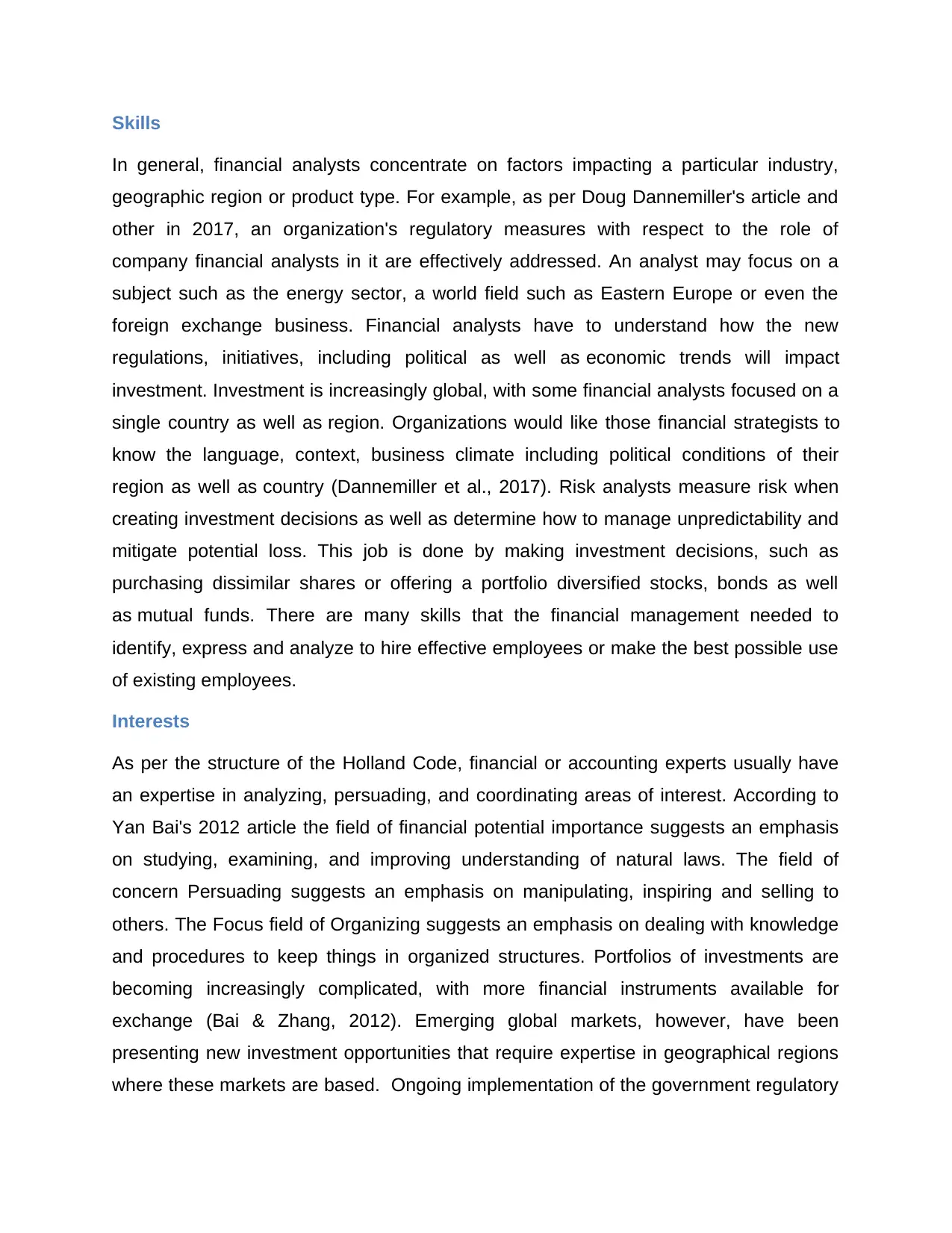
Skills
In general, financial analysts concentrate on factors impacting a particular industry,
geographic region or product type. For example, as per Doug Dannemiller's article and
other in 2017, an organization's regulatory measures with respect to the role of
company financial analysts in it are effectively addressed. An analyst may focus on a
subject such as the energy sector, a world field such as Eastern Europe or even the
foreign exchange business. Financial analysts have to understand how the new
regulations, initiatives, including political as well as economic trends will impact
investment. Investment is increasingly global, with some financial analysts focused on a
single country as well as region. Organizations would like those financial strategists to
know the language, context, business climate including political conditions of their
region as well as country (Dannemiller et al., 2017). Risk analysts measure risk when
creating investment decisions as well as determine how to manage unpredictability and
mitigate potential loss. This job is done by making investment decisions, such as
purchasing dissimilar shares or offering a portfolio diversified stocks, bonds as well
as mutual funds. There are many skills that the financial management needed to
identify, express and analyze to hire effective employees or make the best possible use
of existing employees.
Interests
As per the structure of the Holland Code, financial or accounting experts usually have
an expertise in analyzing, persuading, and coordinating areas of interest. According to
Yan Bai's 2012 article the field of financial potential importance suggests an emphasis
on studying, examining, and improving understanding of natural laws. The field of
concern Persuading suggests an emphasis on manipulating, inspiring and selling to
others. The Focus field of Organizing suggests an emphasis on dealing with knowledge
and procedures to keep things in organized structures. Portfolios of investments are
becoming increasingly complicated, with more financial instruments available for
exchange (Bai & Zhang, 2012). Emerging global markets, however, have been
presenting new investment opportunities that require expertise in geographical regions
where these markets are based. Ongoing implementation of the government regulatory
In general, financial analysts concentrate on factors impacting a particular industry,
geographic region or product type. For example, as per Doug Dannemiller's article and
other in 2017, an organization's regulatory measures with respect to the role of
company financial analysts in it are effectively addressed. An analyst may focus on a
subject such as the energy sector, a world field such as Eastern Europe or even the
foreign exchange business. Financial analysts have to understand how the new
regulations, initiatives, including political as well as economic trends will impact
investment. Investment is increasingly global, with some financial analysts focused on a
single country as well as region. Organizations would like those financial strategists to
know the language, context, business climate including political conditions of their
region as well as country (Dannemiller et al., 2017). Risk analysts measure risk when
creating investment decisions as well as determine how to manage unpredictability and
mitigate potential loss. This job is done by making investment decisions, such as
purchasing dissimilar shares or offering a portfolio diversified stocks, bonds as well
as mutual funds. There are many skills that the financial management needed to
identify, express and analyze to hire effective employees or make the best possible use
of existing employees.
Interests
As per the structure of the Holland Code, financial or accounting experts usually have
an expertise in analyzing, persuading, and coordinating areas of interest. According to
Yan Bai's 2012 article the field of financial potential importance suggests an emphasis
on studying, examining, and improving understanding of natural laws. The field of
concern Persuading suggests an emphasis on manipulating, inspiring and selling to
others. The Focus field of Organizing suggests an emphasis on dealing with knowledge
and procedures to keep things in organized structures. Portfolios of investments are
becoming increasingly complicated, with more financial instruments available for
exchange (Bai & Zhang, 2012). Emerging global markets, however, have been
presenting new investment opportunities that require expertise in geographical regions
where these markets are based. Ongoing implementation of the government regulatory
Secure Best Marks with AI Grader
Need help grading? Try our AI Grader for instant feedback on your assignments.
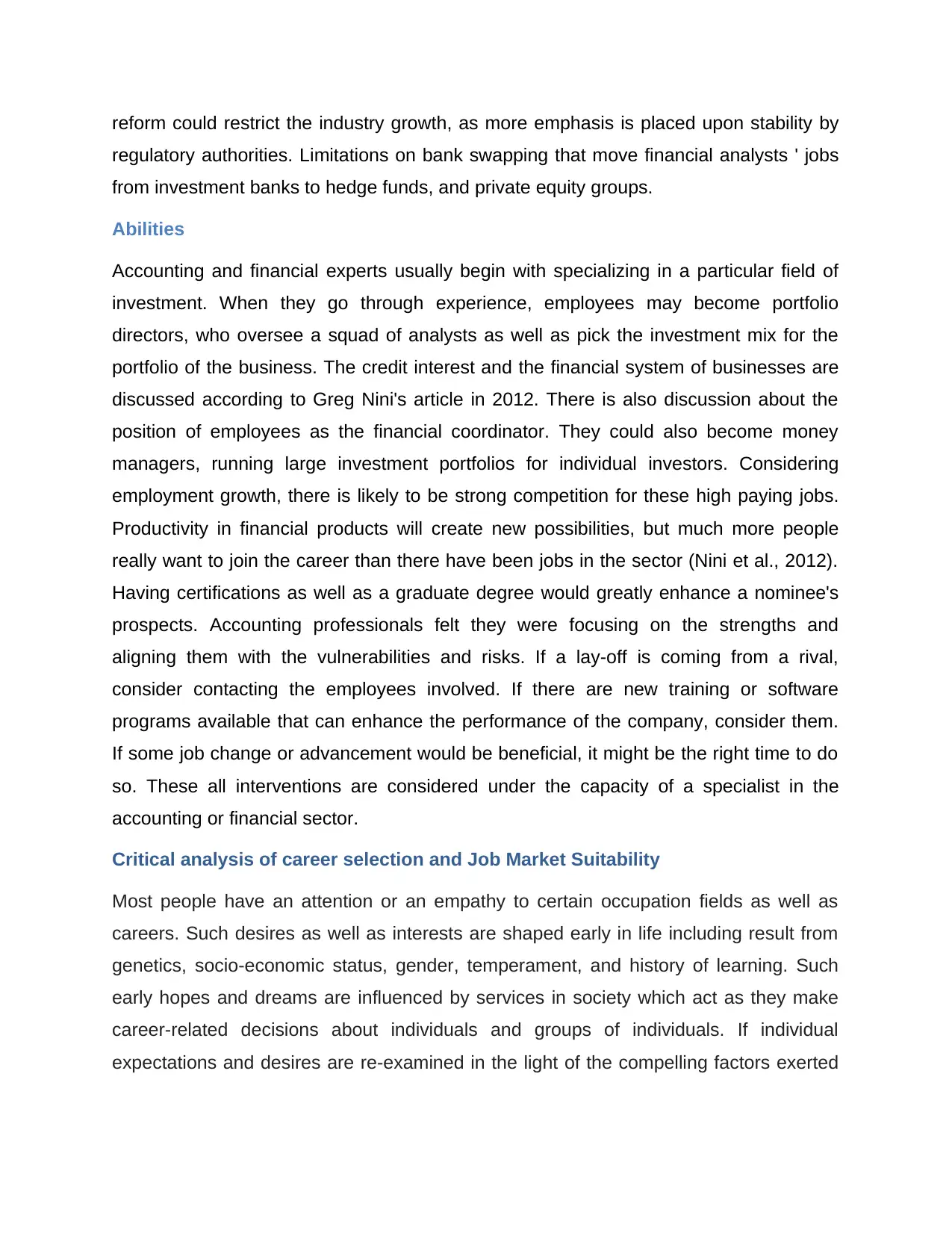
reform could restrict the industry growth, as more emphasis is placed upon stability by
regulatory authorities. Limitations on bank swapping that move financial analysts ' jobs
from investment banks to hedge funds, and private equity groups.
Abilities
Accounting and financial experts usually begin with specializing in a particular field of
investment. When they go through experience, employees may become portfolio
directors, who oversee a squad of analysts as well as pick the investment mix for the
portfolio of the business. The credit interest and the financial system of businesses are
discussed according to Greg Nini's article in 2012. There is also discussion about the
position of employees as the financial coordinator. They could also become money
managers, running large investment portfolios for individual investors. Considering
employment growth, there is likely to be strong competition for these high paying jobs.
Productivity in financial products will create new possibilities, but much more people
really want to join the career than there have been jobs in the sector (Nini et al., 2012).
Having certifications as well as a graduate degree would greatly enhance a nominee's
prospects. Accounting professionals felt they were focusing on the strengths and
aligning them with the vulnerabilities and risks. If a lay-off is coming from a rival,
consider contacting the employees involved. If there are new training or software
programs available that can enhance the performance of the company, consider them.
If some job change or advancement would be beneficial, it might be the right time to do
so. These all interventions are considered under the capacity of a specialist in the
accounting or financial sector.
Critical analysis of career selection and Job Market Suitability
Most people have an attention or an empathy to certain occupation fields as well as
careers. Such desires as well as interests are shaped early in life including result from
genetics, socio-economic status, gender, temperament, and history of learning. Such
early hopes and dreams are influenced by services in society which act as they make
career-related decisions about individuals and groups of individuals. If individual
expectations and desires are re-examined in the light of the compelling factors exerted
regulatory authorities. Limitations on bank swapping that move financial analysts ' jobs
from investment banks to hedge funds, and private equity groups.
Abilities
Accounting and financial experts usually begin with specializing in a particular field of
investment. When they go through experience, employees may become portfolio
directors, who oversee a squad of analysts as well as pick the investment mix for the
portfolio of the business. The credit interest and the financial system of businesses are
discussed according to Greg Nini's article in 2012. There is also discussion about the
position of employees as the financial coordinator. They could also become money
managers, running large investment portfolios for individual investors. Considering
employment growth, there is likely to be strong competition for these high paying jobs.
Productivity in financial products will create new possibilities, but much more people
really want to join the career than there have been jobs in the sector (Nini et al., 2012).
Having certifications as well as a graduate degree would greatly enhance a nominee's
prospects. Accounting professionals felt they were focusing on the strengths and
aligning them with the vulnerabilities and risks. If a lay-off is coming from a rival,
consider contacting the employees involved. If there are new training or software
programs available that can enhance the performance of the company, consider them.
If some job change or advancement would be beneficial, it might be the right time to do
so. These all interventions are considered under the capacity of a specialist in the
accounting or financial sector.
Critical analysis of career selection and Job Market Suitability
Most people have an attention or an empathy to certain occupation fields as well as
careers. Such desires as well as interests are shaped early in life including result from
genetics, socio-economic status, gender, temperament, and history of learning. Such
early hopes and dreams are influenced by services in society which act as they make
career-related decisions about individuals and groups of individuals. If individual
expectations and desires are re-examined in the light of the compelling factors exerted
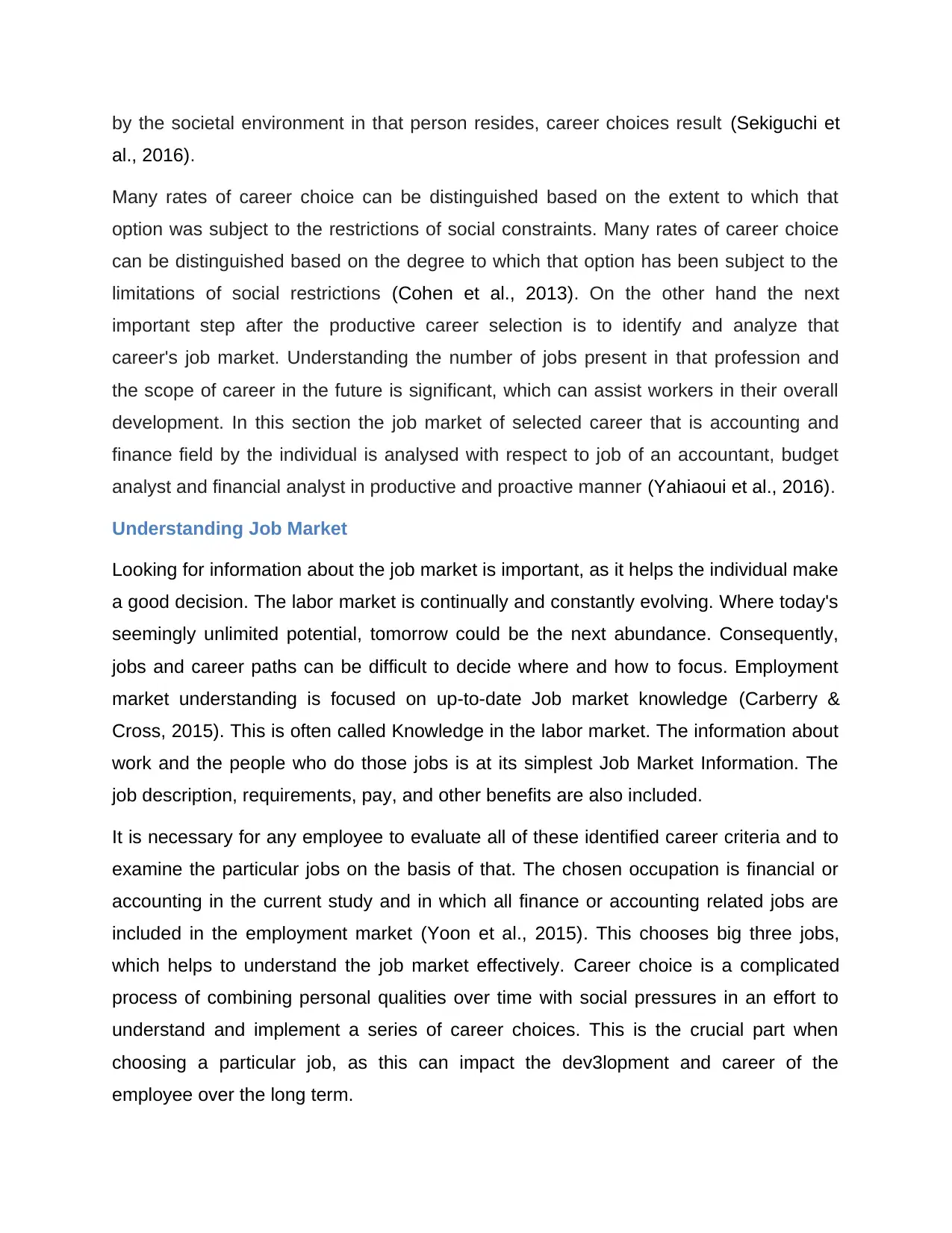
by the societal environment in that person resides, career choices result (Sekiguchi et
al., 2016).
Many rates of career choice can be distinguished based on the extent to which that
option was subject to the restrictions of social constraints. Many rates of career choice
can be distinguished based on the degree to which that option has been subject to the
limitations of social restrictions (Cohen et al., 2013). On the other hand the next
important step after the productive career selection is to identify and analyze that
career's job market. Understanding the number of jobs present in that profession and
the scope of career in the future is significant, which can assist workers in their overall
development. In this section the job market of selected career that is accounting and
finance field by the individual is analysed with respect to job of an accountant, budget
analyst and financial analyst in productive and proactive manner (Yahiaoui et al., 2016).
Understanding Job Market
Looking for information about the job market is important, as it helps the individual make
a good decision. The labor market is continually and constantly evolving. Where today's
seemingly unlimited potential, tomorrow could be the next abundance. Consequently,
jobs and career paths can be difficult to decide where and how to focus. Employment
market understanding is focused on up-to-date Job market knowledge (Carberry &
Cross, 2015). This is often called Knowledge in the labor market. The information about
work and the people who do those jobs is at its simplest Job Market Information. The
job description, requirements, pay, and other benefits are also included.
It is necessary for any employee to evaluate all of these identified career criteria and to
examine the particular jobs on the basis of that. The chosen occupation is financial or
accounting in the current study and in which all finance or accounting related jobs are
included in the employment market (Yoon et al., 2015). This chooses big three jobs,
which helps to understand the job market effectively. Career choice is a complicated
process of combining personal qualities over time with social pressures in an effort to
understand and implement a series of career choices. This is the crucial part when
choosing a particular job, as this can impact the dev3lopment and career of the
employee over the long term.
al., 2016).
Many rates of career choice can be distinguished based on the extent to which that
option was subject to the restrictions of social constraints. Many rates of career choice
can be distinguished based on the degree to which that option has been subject to the
limitations of social restrictions (Cohen et al., 2013). On the other hand the next
important step after the productive career selection is to identify and analyze that
career's job market. Understanding the number of jobs present in that profession and
the scope of career in the future is significant, which can assist workers in their overall
development. In this section the job market of selected career that is accounting and
finance field by the individual is analysed with respect to job of an accountant, budget
analyst and financial analyst in productive and proactive manner (Yahiaoui et al., 2016).
Understanding Job Market
Looking for information about the job market is important, as it helps the individual make
a good decision. The labor market is continually and constantly evolving. Where today's
seemingly unlimited potential, tomorrow could be the next abundance. Consequently,
jobs and career paths can be difficult to decide where and how to focus. Employment
market understanding is focused on up-to-date Job market knowledge (Carberry &
Cross, 2015). This is often called Knowledge in the labor market. The information about
work and the people who do those jobs is at its simplest Job Market Information. The
job description, requirements, pay, and other benefits are also included.
It is necessary for any employee to evaluate all of these identified career criteria and to
examine the particular jobs on the basis of that. The chosen occupation is financial or
accounting in the current study and in which all finance or accounting related jobs are
included in the employment market (Yoon et al., 2015). This chooses big three jobs,
which helps to understand the job market effectively. Career choice is a complicated
process of combining personal qualities over time with social pressures in an effort to
understand and implement a series of career choices. This is the crucial part when
choosing a particular job, as this can impact the dev3lopment and career of the
employee over the long term.
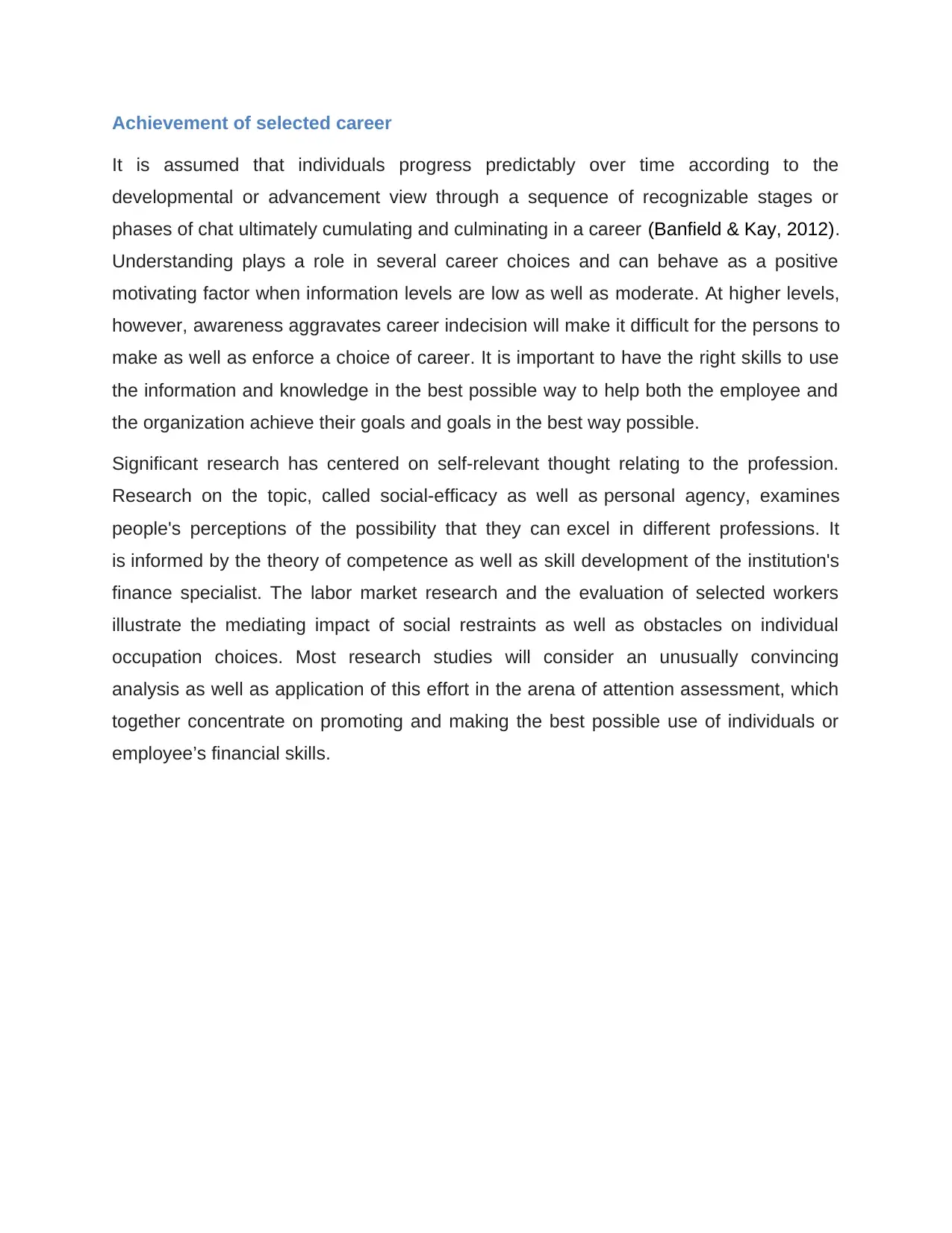
Achievement of selected career
It is assumed that individuals progress predictably over time according to the
developmental or advancement view through a sequence of recognizable stages or
phases of chat ultimately cumulating and culminating in a career (Banfield & Kay, 2012).
Understanding plays a role in several career choices and can behave as a positive
motivating factor when information levels are low as well as moderate. At higher levels,
however, awareness aggravates career indecision will make it difficult for the persons to
make as well as enforce a choice of career. It is important to have the right skills to use
the information and knowledge in the best possible way to help both the employee and
the organization achieve their goals and goals in the best way possible.
Significant research has centered on self-relevant thought relating to the profession.
Research on the topic, called social-efficacy as well as personal agency, examines
people's perceptions of the possibility that they can excel in different professions. It
is informed by the theory of competence as well as skill development of the institution's
finance specialist. The labor market research and the evaluation of selected workers
illustrate the mediating impact of social restraints as well as obstacles on individual
occupation choices. Most research studies will consider an unusually convincing
analysis as well as application of this effort in the arena of attention assessment, which
together concentrate on promoting and making the best possible use of individuals or
employee’s financial skills.
It is assumed that individuals progress predictably over time according to the
developmental or advancement view through a sequence of recognizable stages or
phases of chat ultimately cumulating and culminating in a career (Banfield & Kay, 2012).
Understanding plays a role in several career choices and can behave as a positive
motivating factor when information levels are low as well as moderate. At higher levels,
however, awareness aggravates career indecision will make it difficult for the persons to
make as well as enforce a choice of career. It is important to have the right skills to use
the information and knowledge in the best possible way to help both the employee and
the organization achieve their goals and goals in the best way possible.
Significant research has centered on self-relevant thought relating to the profession.
Research on the topic, called social-efficacy as well as personal agency, examines
people's perceptions of the possibility that they can excel in different professions. It
is informed by the theory of competence as well as skill development of the institution's
finance specialist. The labor market research and the evaluation of selected workers
illustrate the mediating impact of social restraints as well as obstacles on individual
occupation choices. Most research studies will consider an unusually convincing
analysis as well as application of this effort in the arena of attention assessment, which
together concentrate on promoting and making the best possible use of individuals or
employee’s financial skills.
Paraphrase This Document
Need a fresh take? Get an instant paraphrase of this document with our AI Paraphraser
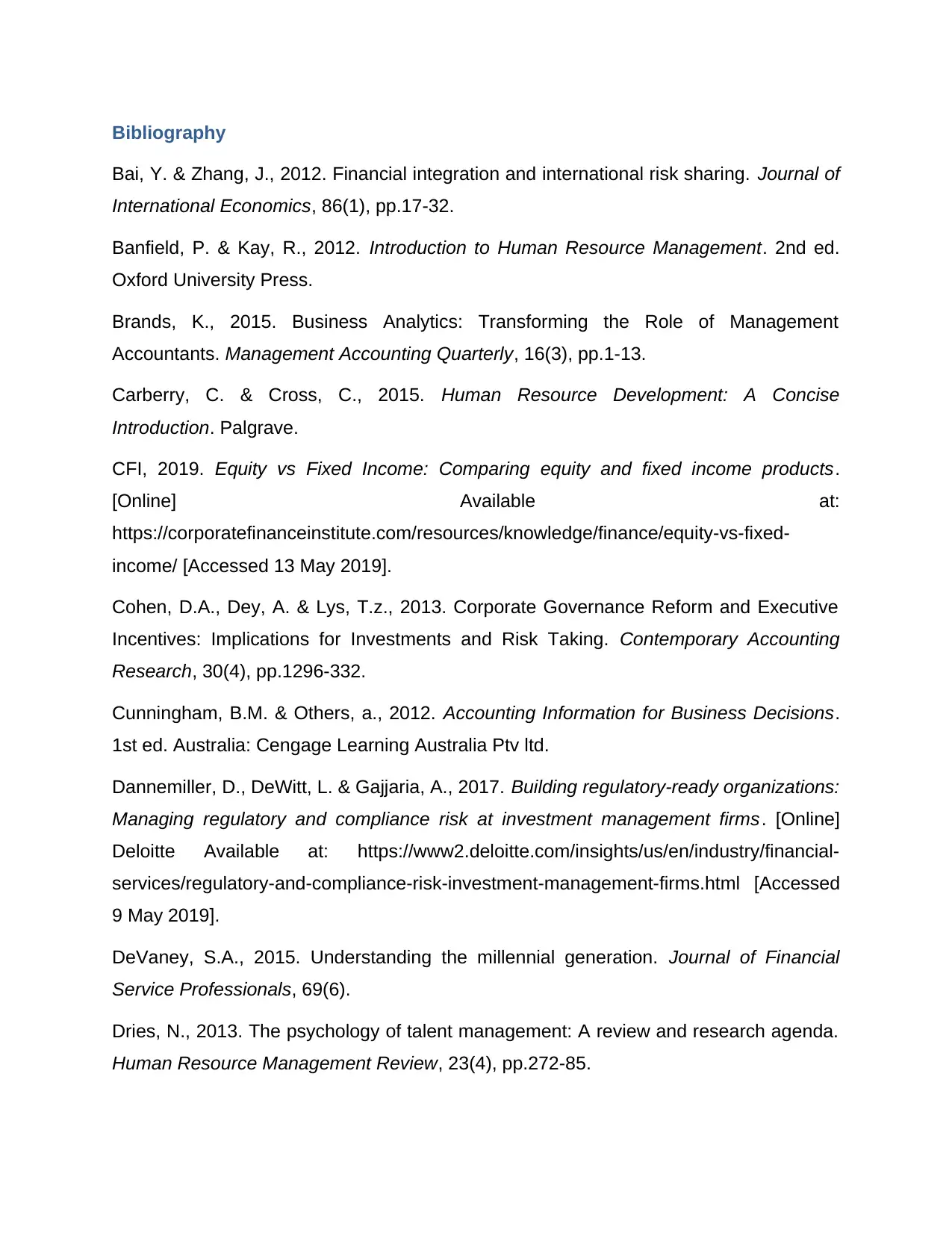
Bibliography
Bai, Y. & Zhang, J., 2012. Financial integration and international risk sharing. Journal of
International Economics, 86(1), pp.17-32.
Banfield, P. & Kay, R., 2012. Introduction to Human Resource Management. 2nd ed.
Oxford University Press.
Brands, K., 2015. Business Analytics: Transforming the Role of Management
Accountants. Management Accounting Quarterly, 16(3), pp.1-13.
Carberry, C. & Cross, C., 2015. Human Resource Development: A Concise
Introduction. Palgrave.
CFI, 2019. Equity vs Fixed Income: Comparing equity and fixed income products.
[Online] Available at:
https://corporatefinanceinstitute.com/resources/knowledge/finance/equity-vs-fixed-
income/ [Accessed 13 May 2019].
Cohen, D.A., Dey, A. & Lys, T.z., 2013. Corporate Governance Reform and Executive
Incentives: Implications for Investments and Risk Taking. Contemporary Accounting
Research, 30(4), pp.1296-332.
Cunningham, B.M. & Others, a., 2012. Accounting Information for Business Decisions.
1st ed. Australia: Cengage Learning Australia Ptv ltd.
Dannemiller, D., DeWitt, L. & Gajjaria, A., 2017. Building regulatory-ready organizations:
Managing regulatory and compliance risk at investment management firms. [Online]
Deloitte Available at: https://www2.deloitte.com/insights/us/en/industry/financial-
services/regulatory-and-compliance-risk-investment-management-firms.html [Accessed
9 May 2019].
DeVaney, S.A., 2015. Understanding the millennial generation. Journal of Financial
Service Professionals, 69(6).
Dries, N., 2013. The psychology of talent management: A review and research agenda.
Human Resource Management Review, 23(4), pp.272-85.
Bai, Y. & Zhang, J., 2012. Financial integration and international risk sharing. Journal of
International Economics, 86(1), pp.17-32.
Banfield, P. & Kay, R., 2012. Introduction to Human Resource Management. 2nd ed.
Oxford University Press.
Brands, K., 2015. Business Analytics: Transforming the Role of Management
Accountants. Management Accounting Quarterly, 16(3), pp.1-13.
Carberry, C. & Cross, C., 2015. Human Resource Development: A Concise
Introduction. Palgrave.
CFI, 2019. Equity vs Fixed Income: Comparing equity and fixed income products.
[Online] Available at:
https://corporatefinanceinstitute.com/resources/knowledge/finance/equity-vs-fixed-
income/ [Accessed 13 May 2019].
Cohen, D.A., Dey, A. & Lys, T.z., 2013. Corporate Governance Reform and Executive
Incentives: Implications for Investments and Risk Taking. Contemporary Accounting
Research, 30(4), pp.1296-332.
Cunningham, B.M. & Others, a., 2012. Accounting Information for Business Decisions.
1st ed. Australia: Cengage Learning Australia Ptv ltd.
Dannemiller, D., DeWitt, L. & Gajjaria, A., 2017. Building regulatory-ready organizations:
Managing regulatory and compliance risk at investment management firms. [Online]
Deloitte Available at: https://www2.deloitte.com/insights/us/en/industry/financial-
services/regulatory-and-compliance-risk-investment-management-firms.html [Accessed
9 May 2019].
DeVaney, S.A., 2015. Understanding the millennial generation. Journal of Financial
Service Professionals, 69(6).
Dries, N., 2013. The psychology of talent management: A review and research agenda.
Human Resource Management Review, 23(4), pp.272-85.
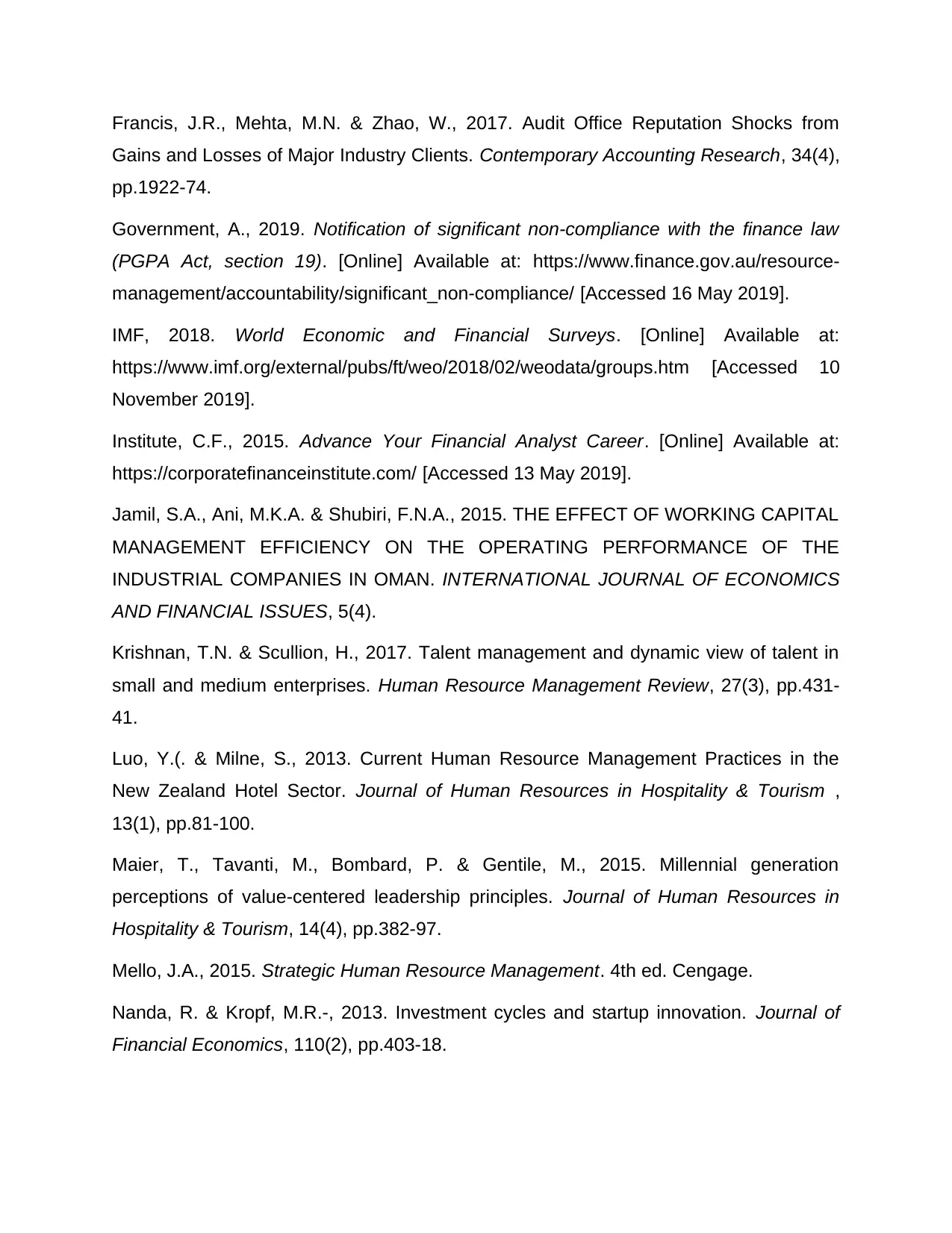
Francis, J.R., Mehta, M.N. & Zhao, W., 2017. Audit Office Reputation Shocks from
Gains and Losses of Major Industry Clients. Contemporary Accounting Research, 34(4),
pp.1922-74.
Government, A., 2019. Notification of significant non-compliance with the finance law
(PGPA Act, section 19). [Online] Available at: https://www.finance.gov.au/resource-
management/accountability/significant_non-compliance/ [Accessed 16 May 2019].
IMF, 2018. World Economic and Financial Surveys. [Online] Available at:
https://www.imf.org/external/pubs/ft/weo/2018/02/weodata/groups.htm [Accessed 10
November 2019].
Institute, C.F., 2015. Advance Your Financial Analyst Career. [Online] Available at:
https://corporatefinanceinstitute.com/ [Accessed 13 May 2019].
Jamil, S.A., Ani, M.K.A. & Shubiri, F.N.A., 2015. THE EFFECT OF WORKING CAPITAL
MANAGEMENT EFFICIENCY ON THE OPERATING PERFORMANCE OF THE
INDUSTRIAL COMPANIES IN OMAN. INTERNATIONAL JOURNAL OF ECONOMICS
AND FINANCIAL ISSUES, 5(4).
Krishnan, T.N. & Scullion, H., 2017. Talent management and dynamic view of talent in
small and medium enterprises. Human Resource Management Review, 27(3), pp.431-
41.
Luo, Y.(. & Milne, S., 2013. Current Human Resource Management Practices in the
New Zealand Hotel Sector. Journal of Human Resources in Hospitality & Tourism ,
13(1), pp.81-100.
Maier, T., Tavanti, M., Bombard, P. & Gentile, M., 2015. Millennial generation
perceptions of value-centered leadership principles. Journal of Human Resources in
Hospitality & Tourism, 14(4), pp.382-97.
Mello, J.A., 2015. Strategic Human Resource Management. 4th ed. Cengage.
Nanda, R. & Kropf, M.R.-, 2013. Investment cycles and startup innovation. Journal of
Financial Economics, 110(2), pp.403-18.
Gains and Losses of Major Industry Clients. Contemporary Accounting Research, 34(4),
pp.1922-74.
Government, A., 2019. Notification of significant non-compliance with the finance law
(PGPA Act, section 19). [Online] Available at: https://www.finance.gov.au/resource-
management/accountability/significant_non-compliance/ [Accessed 16 May 2019].
IMF, 2018. World Economic and Financial Surveys. [Online] Available at:
https://www.imf.org/external/pubs/ft/weo/2018/02/weodata/groups.htm [Accessed 10
November 2019].
Institute, C.F., 2015. Advance Your Financial Analyst Career. [Online] Available at:
https://corporatefinanceinstitute.com/ [Accessed 13 May 2019].
Jamil, S.A., Ani, M.K.A. & Shubiri, F.N.A., 2015. THE EFFECT OF WORKING CAPITAL
MANAGEMENT EFFICIENCY ON THE OPERATING PERFORMANCE OF THE
INDUSTRIAL COMPANIES IN OMAN. INTERNATIONAL JOURNAL OF ECONOMICS
AND FINANCIAL ISSUES, 5(4).
Krishnan, T.N. & Scullion, H., 2017. Talent management and dynamic view of talent in
small and medium enterprises. Human Resource Management Review, 27(3), pp.431-
41.
Luo, Y.(. & Milne, S., 2013. Current Human Resource Management Practices in the
New Zealand Hotel Sector. Journal of Human Resources in Hospitality & Tourism ,
13(1), pp.81-100.
Maier, T., Tavanti, M., Bombard, P. & Gentile, M., 2015. Millennial generation
perceptions of value-centered leadership principles. Journal of Human Resources in
Hospitality & Tourism, 14(4), pp.382-97.
Mello, J.A., 2015. Strategic Human Resource Management. 4th ed. Cengage.
Nanda, R. & Kropf, M.R.-, 2013. Investment cycles and startup innovation. Journal of
Financial Economics, 110(2), pp.403-18.
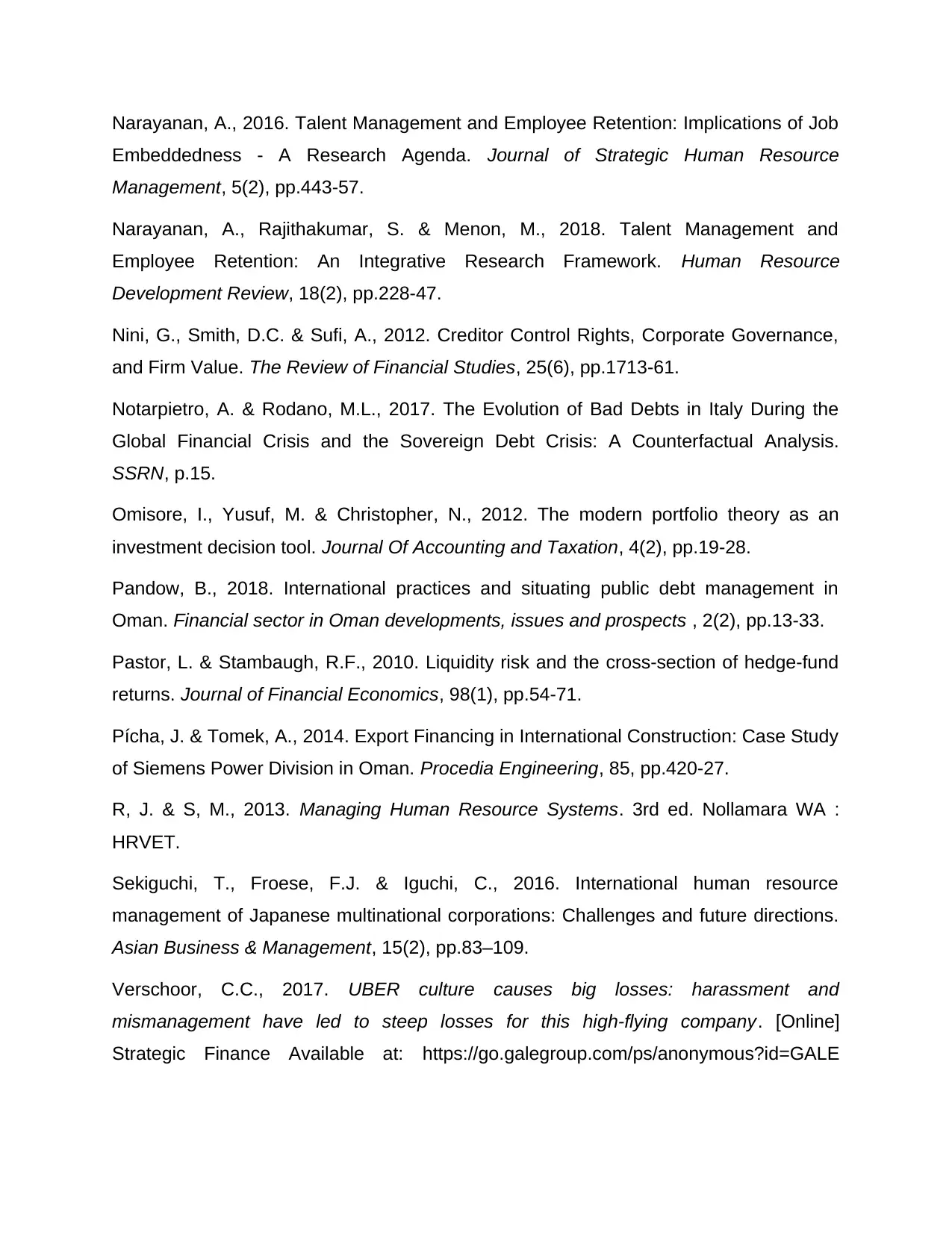
Narayanan, A., 2016. Talent Management and Employee Retention: Implications of Job
Embeddedness - A Research Agenda. Journal of Strategic Human Resource
Management, 5(2), pp.443-57.
Narayanan, A., Rajithakumar, S. & Menon, M., 2018. Talent Management and
Employee Retention: An Integrative Research Framework. Human Resource
Development Review, 18(2), pp.228-47.
Nini, G., Smith, D.C. & Sufi, A., 2012. Creditor Control Rights, Corporate Governance,
and Firm Value. The Review of Financial Studies, 25(6), pp.1713-61.
Notarpietro, A. & Rodano, M.L., 2017. The Evolution of Bad Debts in Italy During the
Global Financial Crisis and the Sovereign Debt Crisis: A Counterfactual Analysis.
SSRN, p.15.
Omisore, I., Yusuf, M. & Christopher, N., 2012. The modern portfolio theory as an
investment decision tool. Journal Of Accounting and Taxation, 4(2), pp.19-28.
Pandow, B., 2018. International practices and situating public debt management in
Oman. Financial sector in Oman developments, issues and prospects , 2(2), pp.13-33.
Pastor, L. & Stambaugh, R.F., 2010. Liquidity risk and the cross-section of hedge-fund
returns. Journal of Financial Economics, 98(1), pp.54-71.
Pícha, J. & Tomek, A., 2014. Export Financing in International Construction: Case Study
of Siemens Power Division in Oman. Procedia Engineering, 85, pp.420-27.
R, J. & S, M., 2013. Managing Human Resource Systems. 3rd ed. Nollamara WA :
HRVET.
Sekiguchi, T., Froese, F.J. & Iguchi, C., 2016. International human resource
management of Japanese multinational corporations: Challenges and future directions.
Asian Business & Management, 15(2), pp.83–109.
Verschoor, C.C., 2017. UBER culture causes big losses: harassment and
mismanagement have led to steep losses for this high-flying company. [Online]
Strategic Finance Available at: https://go.galegroup.com/ps/anonymous?id=GALE
Embeddedness - A Research Agenda. Journal of Strategic Human Resource
Management, 5(2), pp.443-57.
Narayanan, A., Rajithakumar, S. & Menon, M., 2018. Talent Management and
Employee Retention: An Integrative Research Framework. Human Resource
Development Review, 18(2), pp.228-47.
Nini, G., Smith, D.C. & Sufi, A., 2012. Creditor Control Rights, Corporate Governance,
and Firm Value. The Review of Financial Studies, 25(6), pp.1713-61.
Notarpietro, A. & Rodano, M.L., 2017. The Evolution of Bad Debts in Italy During the
Global Financial Crisis and the Sovereign Debt Crisis: A Counterfactual Analysis.
SSRN, p.15.
Omisore, I., Yusuf, M. & Christopher, N., 2012. The modern portfolio theory as an
investment decision tool. Journal Of Accounting and Taxation, 4(2), pp.19-28.
Pandow, B., 2018. International practices and situating public debt management in
Oman. Financial sector in Oman developments, issues and prospects , 2(2), pp.13-33.
Pastor, L. & Stambaugh, R.F., 2010. Liquidity risk and the cross-section of hedge-fund
returns. Journal of Financial Economics, 98(1), pp.54-71.
Pícha, J. & Tomek, A., 2014. Export Financing in International Construction: Case Study
of Siemens Power Division in Oman. Procedia Engineering, 85, pp.420-27.
R, J. & S, M., 2013. Managing Human Resource Systems. 3rd ed. Nollamara WA :
HRVET.
Sekiguchi, T., Froese, F.J. & Iguchi, C., 2016. International human resource
management of Japanese multinational corporations: Challenges and future directions.
Asian Business & Management, 15(2), pp.83–109.
Verschoor, C.C., 2017. UBER culture causes big losses: harassment and
mismanagement have led to steep losses for this high-flying company. [Online]
Strategic Finance Available at: https://go.galegroup.com/ps/anonymous?id=GALE
Secure Best Marks with AI Grader
Need help grading? Try our AI Grader for instant feedback on your assignments.
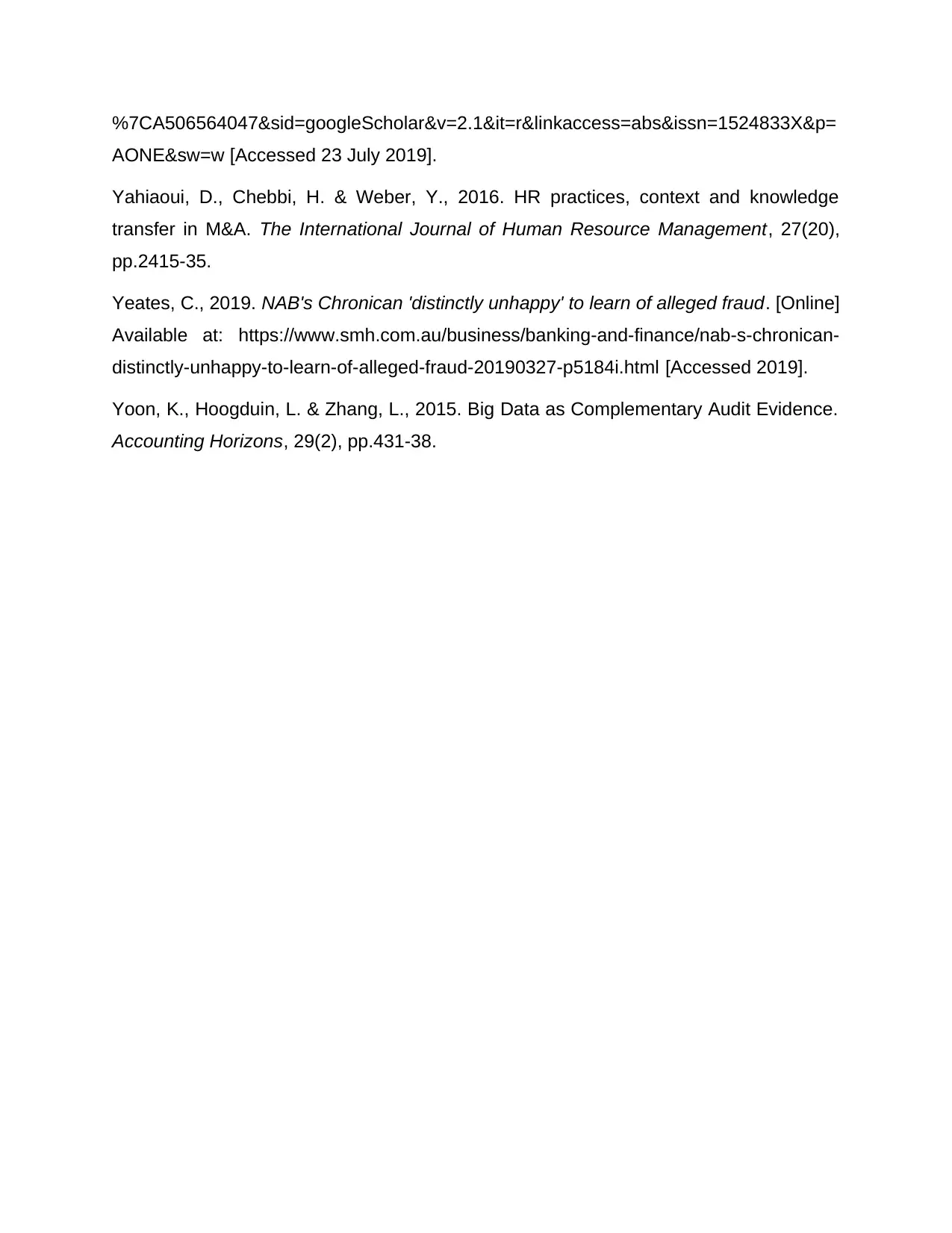
%7CA506564047&sid=googleScholar&v=2.1&it=r&linkaccess=abs&issn=1524833X&p=
AONE&sw=w [Accessed 23 July 2019].
Yahiaoui, D., Chebbi, H. & Weber, Y., 2016. HR practices, context and knowledge
transfer in M&A. The International Journal of Human Resource Management, 27(20),
pp.2415-35.
Yeates, C., 2019. NAB's Chronican 'distinctly unhappy' to learn of alleged fraud. [Online]
Available at: https://www.smh.com.au/business/banking-and-finance/nab-s-chronican-
distinctly-unhappy-to-learn-of-alleged-fraud-20190327-p5184i.html [Accessed 2019].
Yoon, K., Hoogduin, L. & Zhang, L., 2015. Big Data as Complementary Audit Evidence.
Accounting Horizons, 29(2), pp.431-38.
AONE&sw=w [Accessed 23 July 2019].
Yahiaoui, D., Chebbi, H. & Weber, Y., 2016. HR practices, context and knowledge
transfer in M&A. The International Journal of Human Resource Management, 27(20),
pp.2415-35.
Yeates, C., 2019. NAB's Chronican 'distinctly unhappy' to learn of alleged fraud. [Online]
Available at: https://www.smh.com.au/business/banking-and-finance/nab-s-chronican-
distinctly-unhappy-to-learn-of-alleged-fraud-20190327-p5184i.html [Accessed 2019].
Yoon, K., Hoogduin, L. & Zhang, L., 2015. Big Data as Complementary Audit Evidence.
Accounting Horizons, 29(2), pp.431-38.
1 out of 17
Related Documents
Your All-in-One AI-Powered Toolkit for Academic Success.
+13062052269
info@desklib.com
Available 24*7 on WhatsApp / Email
![[object Object]](/_next/static/media/star-bottom.7253800d.svg)
Unlock your academic potential
© 2024 | Zucol Services PVT LTD | All rights reserved.





